#out of context laws of attraction
Explore tagged Tumblr posts
Text



out of context laws of attraction (3/?)
#laws of attraction the series#out of context laws of attraction#very keen to remind everyone this happens. in episode 1
103 notes
·
View notes
Text
they should've never made ada a hacker (specifically with her intercepting luis' emails to his college friend & that one scene in damnation where she forces the elevator to svetlana's laboratory to open to help leon & sasha + herself escape the self destruction sequence she intentionally activated) because i've taken it now to mean (i watch way too many computer software review & repair videos) she will be annoying about her preferred linux distributions to anyone who will listen, fellow spies, hackers & whichever partner wakes up to ada typing away on her laptop in their living room looking like she hasn't slept the whole night
#* file // : OOC — ( 𝐓𝐇𝐄 𝐏𝐎𝐒𝐓𝐄𝐑'𝐒 𝐂𝐑𝐔𝐒𝐀𝐃𝐄 . )#* file // : 004 — ( 𝐇𝐄𝐀𝐃𝐂𝐀𝐍𝐎𝐍 . )#i'm very sorry but any technical skill/proficiency with computers instantly makes you a little bit of a nerd#it's law#that's one of her many secretive hidden traits very few will fully realize because she has to keep her mystique & allure at the forefront#it's inciting & disarming because often people's perceptions of attractive women's intellect run opposite to their looks#& while being underestimated is workable it is as equally deadly depending on who sees her as lesser#it is not always empowering to demolish the preconceived notions forced onto you#especially for a woman like her#i've talked before about how useful her hacking ability is in the context of corporate espionage as a way to remove the need for a handler#or paying off others to do the research ada can very well do herself#but it is also a skillset that allows her to get employed under her various personas & aliases as a data analyst or a cybersecurity expert#(with faked credentials hosted on an unsuspecting previous employer's websites for however long her credibility needs to last)#to strike at the core of a corporation's private data#she's very talented#i like to think that during one of these assignments she ran into ethan winters sometime in the late 2000s#& it was just a random coincidence where she thought nothing of him beyond being a fellow systems engineer working in a gray office complex#only for him to become such a central figure in the BSAA's dulvey coverup her eyes perked up reading their internal documentation#thinking it all a little too funny#all this without even mentioning her later relationship with mia that me & les (terrorgone) have plotted out
7 notes
·
View notes
Text

Not something you read everyday 🤣
17 notes
·
View notes
Text

(yandere! prison warden x gn! inmate reader) (FYI idk how the law works ok so DON'T come after my ass) (im the type of lawyer that gets ur sentence increased instead of decreased fr💀💀)
"can i kiss you?"
"dude, i literally threatened to kill you."
"so?"
he stares at you with a raised eyebrow, pouting slightly as he leans against the bars of your prison cell. you choose to ignore him, instead opting to play with the plastic fork from your lunch tray.
damn it, you should've known better than to be caught. now you're stuck in this lame ass prison with this warden you don't even like.
curse that stupid lawyer who got your sentenced increased from fifty years to life imprisonment. dude sucked at his job and still got paid 💀
for some context, you were in prison for tax evasion, fraud, and multiple cyber crimes you shall not name. you got caught by accident and now you were here. sentenced to life imprisonment in jail. in a private cell.
you know, it isn't even half that bad as compared to some other crimes others have committed! so you haven't a slightest clue as to why you were placed in a private cell with no one to keep you company!
i mean, you did try befriending your warden but he turned out to be delusional and turned out to be one of the people you scammed. love-scammed, to be specific. which is why he might've been delusional...
"baby why'd you have to leave me? i was so sad..."
see? this is what you mean! he seriously didn't get the hint that he was scammed! even when you told him straight to his face that you never did actually love him!
god damn it. now you have to hear his yapping 24/7. you're starting to think that he might've been the one to report you. i mean, isn't it a little too convenient? he's a prison warden, you've got a private cell-
"hey! are you seriously not paying attention to me?!"
he hits the prison bars lightly to attract your attention. thankfully, it did. or else he might've thrown another tantrum. and you did not have the mental capacity to handle it. come on! if he did it would've been his third tantrum of the week! and it's only monday!
you cock your head at him, rolling your eyes as you acknowledge his presence. your annoying prison warden instantly lights up at the small gesture. oh well, at least he's in love with you to the point where even you acknowledging him makes him happy...
"babe! you've gotta stop ignoring me! it makes me sad..."
"i don't actually care."
"baby!"
damn it, maybe you should've just bribed the judge to let you have a death sentence instead.
#yandere#tw yandere#yandere x reader#yandere imagines#yandere scenarios#yandere drabbles#yandere prison warden#yandere prison warden x reader#gn reader#suiana brainrotting#suiana rambling
3K notes
·
View notes
Note
How would you describe Tim's people skills? Especially when you compare them to Dick's?
Hi anon, this was a fun ask!! I picked out a few panels for each of them (comforting friends, a bit out of sync with friends, fighting with friends, and offering practical support to friends) just to get a quick look at their people skills in action, and then I rambled on about my thoughts on their strengths and their weaknesses.
(Caveat: I'm going to try to focus on my ideas about differences between the two of them, since we're comparing, but I do think they're socially more similar than not, so you might also want to check out @bitimdrake's post on Dick and Tim's similarities for the big picture!)
Short version: I think they've both got good people skills. Dick's are a bit better and more natural, whereas Tim's are more practiced and learned (in ways that sometimes show).
Let's start with Dick first, and then I'll get back to Tim.
Dick
Comforting friends in Titans Secret Files:
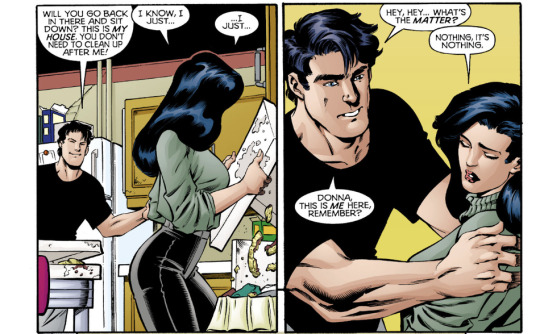
Dick: Will you go back in there and sit down? This is my house. You don't need to clean up after me! Donna: I know, I just... I just ... Dick: Hey, hey... what's the matter? Donna: Nothing. It's nothing. Dick (reaching out to supportively grip her shoulders): Donna, this is me here, remember?
A bit out of sync with friends (but still getting along well) in Titans 3:
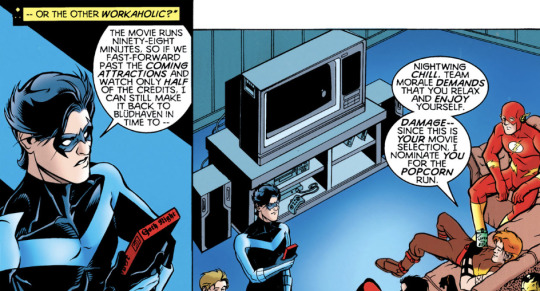
Dick: The movie runs 98 minutes. So if we fast-forward past the coming attractions and watch only half the credits, I can still make it back to Blüdhaven in time to - Roy: Nightwing, chill. Team morale demands that you relax and enjoy yourself.
Fighting with friends in Titans 13:
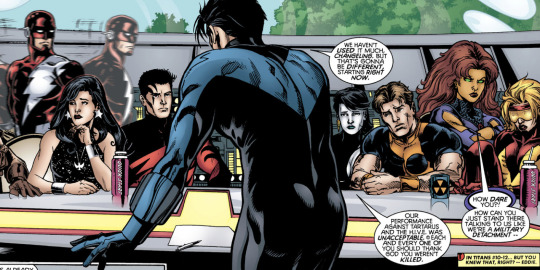
Dick: We haven't used it much, Changeling. But that's gonna be different. Starting right now. Our performance against Tartarus and the HIVE was unacceptable. Each and every one of you should thank God you weren't killed. Kory: How dare you? How can you just stand there talking to us like we're a military detachment -
Giving support to relative strangers in Nightwing 87:

Neighbor 1: Oh, he - he's a true gentleman, you know? Always holds the door, or helps me up the stairs with my groceries if we both come in at the same time... Neighbor 2: ...used his motorcycle to jumpstart my car one morning and even got my brother-in-law a job with Wayne Enterprises when he got laid off... Neighbor 3: ...and he's very, very, very nice and doesn't talk down to me. Plus he lets me use his basketball.
Offering practical support (making dinner) in Prodigal:
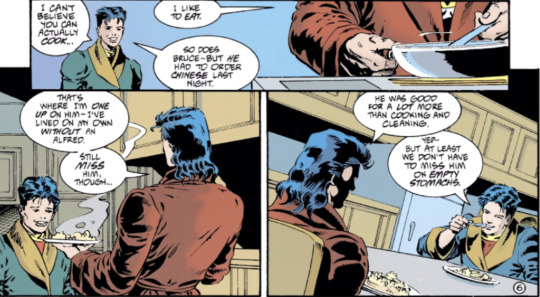
Tim: I can't believe you can actually cook... Dick: I like to eat. Tim: So does Bruce - but he had to order Chinese last night. Dick: That's where I'm one up on him - I've lived on my own without an Alfred. Still miss him, though... He was good for a lot more than cooking and cleaning. Tim: Yeah. But at least we don't have to miss him on empty stomachs.
Strengths:
I think Dick's people skills are pretty simple: he has them! He's good at people! And I tend to think of Dick's people skills as so automatic they're mostly instinctive. It's not something he really has to think about because it's so ingrained in him. A combination of natural talent plus a childhood spent around sociable performers means Dick's just really highly attuned to the people around him.
And I don't think he's particularly obvious about it. So e.g. you could be having a conversation with Dick where he didn't seem like he was paying close attention, but if there was An Important Moment where you got anxious for a moment or let something important slip or let a bit of anger show through etc. - Dick will have picked up on it, even if it's unconsciously, and it'll stick with him and come back to him later.
And just generally - I think Dick has good instincts for who he can trust and who he shouldn't trust; when he's treading on conversational landmines he'll often pick up the unease even if he doesn't have the context to know why there's a problem; if he's trying to comfort and trusts his instincts he'll often do the right thing even if he can't justify in words why he felt like that was the right thing to do.
So I think for Dick, there's always the level of conscious awareness - the things he's aware he knows, if you will - and the level of unconscious awareness - things he senses, but maybe can't explain, or maybe doesn't want to know so he's suppressing the thoughts.
So he's good at leading, and he's good at comforting, and he's good at listening, and he's good at figuring out the right thing to say...
Like, he's good at all of it, so it's actually sort of difficult to elaborate because there's just not that much nuance? Given any particular interpersonal situation, Dick has an excellent chance of getting a quick read on some random guy he's just met and then getting the reaction he wants pretty fast, whether it's intimidating the guy or comforting him or getting him to cooperate or taunting him until he loses his temper, etc etc etc.
Obviously Dick's not a mind reader, and he can get things wrong, especially when he's in the throes of one of his own personal crises, but generally I think Dick's very very sure-footed with people, even with strangers.
Weaknesses:
This isn't a weakness precisely because Dick's usually doing it on purpose, but he'll sometimes have fights with his friends because they think he's acting overly professional/detached and he thinks they're not being professional enough. So e.g. in Titans 13, you can see Dick's set up the room almost like he's leading a business meeting, and he's the boss lecturing them, and they're reacting by getting mad at him. Part of this is basically a Traditional Bat Problem - Tim's friends also balk because they feel like Tim's keeping them at a distance - but Dick tends to lean especially hard on "I'm The Leader Here So Shut Up And Do What I Say" professionalism / distancing.
When things are going well, Dick's friends may grumble at his intense professionalism but basically appreciate it (this is basically how things go in their reunion in TT vol 2); when things are not going well, though, it becomes a point of tension. Generally, Dick gets extra-professional as a coping mechanism when under stress, as here in TT vol 2 12:
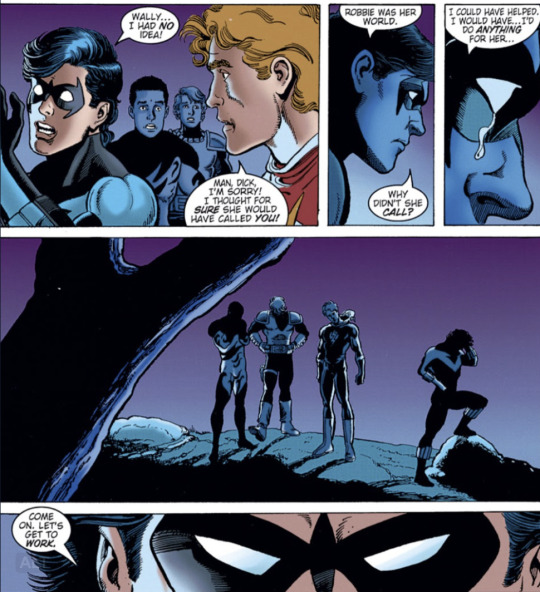
To the extent that Dick falters with social skills, it tends to be almost exclusively with people he knows well, not with strangers. Dick sometimes struggles with maintaining relationships, largely because he's often juggling multiple responsibilities; he'll sometimes get hyperfixated on something and deprioritize his more stable relationships (so e.g. when he gets fixated on trying to fix Blüdhaven and gets distracted from his relationship with Babs).
Somewhat relatedly, if things start going wrong in his own life, he tends to self-isolate out of shame and avoid everyone he thinks of as more put-together. So, for example, in the aftermath of Blockbuster, he's a self-destructive mess who's trying to dodge and/or drive away Clark and Roy and Tim (all people who care about him and would want to help), but Sophia Tevis and Rose are two messed-up young strangers in trouble and their obvious neediness trips his "urgency" meter, plus he may be a mess but they have no context to realize that so he doesn't feel so self-conscious, and he's able to be drive-by super-helpful to them and then dive right back into privately self-destructing.
Also not a weakness per se, but he tends to be a bit of an introvert in general - he and Wally are close, but they go long stretches of time without catching up; when he's spending time with friends, usually it's Donna / Wally / the Titans / Tim visiting Dick rather than the other way around; he's more likely to get cajoled into joining a team than the other way round - Wally talks him into rejoining the Titans and Roy talks him into joining the Outsiders. He likes people and likes spending time with friends, but he's usually not the one initiating a social gathering. He's self-aware about this; in Titans 9, he muses, "It's not the newness that's the problem. The problem is the old stuff. The ruts. You know someone long enough - well enough - and you fall into a rut with them... you completely take the relationship for granted..."
Relatedly, because Dick's pretty self-contained, he has a recurring problem where loved ones interpret him as distant or detached or indifferent even when he's still passionately attached - both Kory and Babs break up with Dick in part because they feel like he's not really that committed to them (also there are mmm Problematic Plotlines involved but I'm ignoring those for the purposes of this post), and in both cases IMO they're misreading him. He's deeply upset by both breakups and responds with big declarations of feeling and, uh, proposing marriage shortly afterward. (Okay, so he's not ALWAYS sure-footed sdfdsfs)
When Dick's getting something wrong, it's usually because he's upset and overcompensating - when things with Kory and Babs are tense, he tries to fix it with Big Gestures; when Vic's mad at him about spying, he missteps with an elaborate secret plan culminating in a big dramatic offering of a new body which Vic does want... but he's still understandably miffed at Dick for making a bunch of decisions behind his back instead of talking to him. Dick guesses right about something Vic will want, but because Dick when he's feeling guilty tends to slide into I-Am-The-Leader, I-Must-Fix-Everything-By-Myself, I-Am-Responsible-For-Everything mode, he forgets that the whole original problem is connected to not respecting Vic's autonomy / right to make decisions for himself, and that a better gesture would be asking Vic what he wants instead of once again making decisions on his behalf without consulting him. (I'm sympathetic to Dick's spying-on-Vic plan on account of how Vic did turn into an evil moon for a bit - comics are bonkers, you guys sdfdsfs - but I'm also very sympathetic to Vic feeling that he deserved fuller disclosure here.)
And you can see similar patterns in lower-key conflicts too: every time Dick gets accused of being just like Batman, it's usually because he's coming off as harsh or detached or uncaring (sometimes on purpose because he's pushing people away; sometimes just because Dick handles grief and fear by shutting down; sometimes because his the-buck-stops-here leadership style can come off as overly-detached), even though Dick actually cares SO SO MUCH, all the time, about everyone he knows.
But honestly... these weaknesses exist, but they're minor in comparison to his strengths?? Dick's a guy with a lot of very strong friendships for a reason. He's true as steel and once he cares about you, he cares about you forever. <3
OKAY! So that's Dick. Let's finally move on to...
Tim
Comforting friends in Joker's Last Laugh 3:
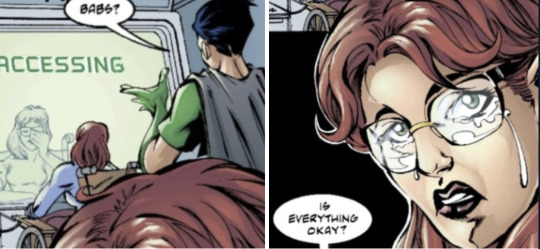
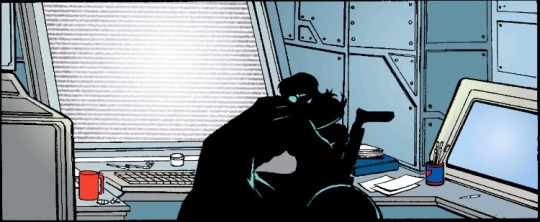
Tim: Babs? Is everything okay? (hugs her)
A bit out-of-sync with friends (but still getting along well) in Young Justice 7:
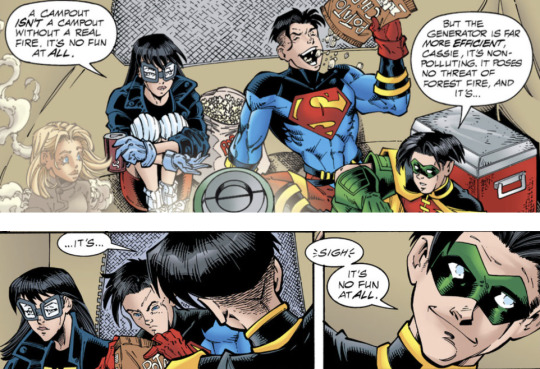
Cassie: A campout isn't a campout without a real fire. It's no fun at all. Tim: But the generator is far more efficient, Cassie. It's non-polluting, it poses no threat of forest fire, and it's... it's ... (taking in everybody else's expressions, sighing, reversing course) It's no fun at all. Impulse, can you...?
Fighting with friends in Adventure Comics 3 (stonewalling, avoidance, and lying!)
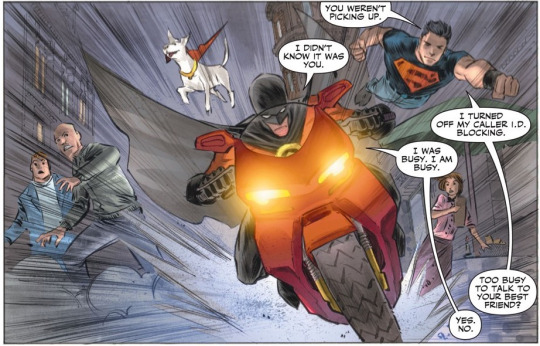
Conner: You weren't picking up. Tim: I didn't know it was you. Conner: I turned off my caller ID blocking. Tim: I was busy. I am busy. Conner: Too busy to talk to your best friend? Tim: Yes. No.
Giving emotional support to relative strangers in Robin 98 / 100 / 156:
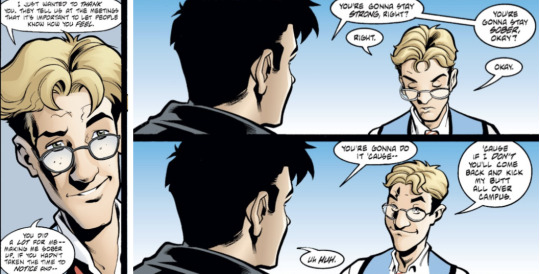
Wesley: I just wanted to thank you. They tell us at the meetings that it's important to let people know how you feel. You did a lot for me - making me sober up. If you hadn't taken the time to notice - (Later) Tim: You're gonna stay strong, right? (Wesley: Right.) Tim: You're gonna stay sober, okay? (Wesley: Okay.) Tim: You're gonna do it 'cause - Wesley: 'Cause if I don't you'll come back and kick my butt all over campus. Tim: Uh huh.
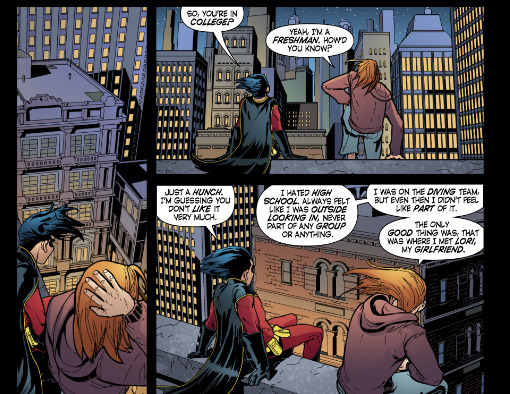
(The redhaired guy was about to jump. Tim convinces him to sit down and talk first.) Tim: So, you're in college? Guy: Yeah, I'm a freshman. How'd you know? Tim: Just a hunch. I'm guessing you don't like it much. Guy: I always hated high school. Always felt like I was outside looking in, never part of any group or anything. I was on the diving team but even then I didn't feel like part of it. The only good thing was that was where I met Lori, my girlfriend.
Offering practical support (medical care and tea) in Batgirl 59:
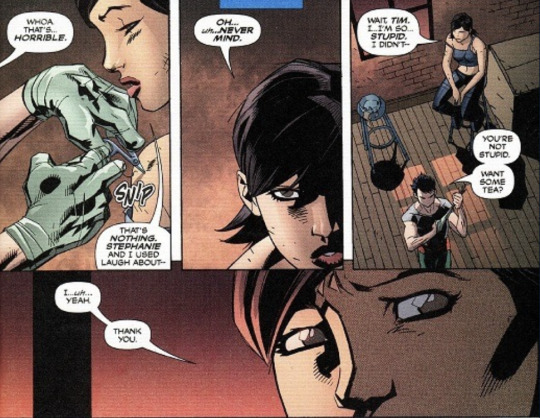
Tim (treating her injury as she shares her traumatic past): Whoa. That's ... horrible. Cass: That's nothing. Stephanie and I used to laugh about - oh... uh... never mind. Wait, Tim. I... I'm so ... stupid, I don't - Tim: You're not stupid. Want some tea? Cass: I ... uh... yeah. Thank you.
Strengths:
Tim! I think Tim's also pretty decent at people - not as good as Dick, but hardly anyone is?
I tend to think of Dick as instinctively good at people, and Tim as more consciously good at people.
Tim spends a lot of time being intentionally watchful: observing, spying, psychoanalyzing people, paying careful attention to what they say, thinking about what makes them tick. (And Tim psychoanalyzes himself, too. Tim is studiously engaged in the study of Tim, and of Tim's friends, and of Tim's family. He's often playing a role, even when that role is "Tim Drake.")
So e.g. in Red Robin, at one point Tim has an elaborate domino-falling database where he's compiled a list of villains he wants to fight and how he wants to fight them, all leading up to a very careful takedown plan for Boomerang where he's thought through and anticipated Boomerang's every move ahead of time... and he's basically right! He gets it all right!
And this kind of intensely-studied logical chess-game of "he will do this for this reason, and then this for that reason, and the other people will respond in this way, like a series of dominos, and I've thought through all the possibilities" is Very Tim to me, and I feel like... this is just the sort of thing that Dick would never ever do?
And mostly Dick wouldn't do it because he wouldn't have to. When Dick's skeptical of James Gordon Jr., he goes to talk to the guy and feel him out, and he ethically feels obliged to give him the benefit of the doubt because there's no evidence against him, but he's got a bad feeling and doesn't trust him and secretly slaps a tracer on him because he's got an instinct he'll want it, and he's right: James Jr. is up to something, and that tracer is exactly the thing that Dick needs.
And similarly if Dick wanted to goad James Jr. into doing something, I think he'd go off and meet him and goad him into doing it, and he'd have an instinct for what to say to make that happen - I think the whole elaborate domino plan that Tim comes up with for Boomerang would feel unnecessarily complex to Dick. Not that Dick doesn't make complicated plans, because he absolutely does, but Dick doesn't usually overthink people.
Similarly, if Dick had been the little kid in Lonely Place of Dying, he'd have gotten worried and gone straight to Bruce and talked to him, not gotten worried and taken photos of Bruce from a distance and then come up with an elaborately overthought plan to go to New York and track down his estranged son and fix him that way. And, like. Kid!Tim's not entirely wrong! He's correctly picked up on a very real and very strong connection between Bruce and Dick even though he doesn't know either of them! And given how little actual information Tim has, this is actually an impressive plan (it's a bad plan, because Tim doesn't know about their fights, but it's an impressively solid plan given that his entire information basis is "watched them from a distance and collected news reports"). But this isn't how Dick thinks about people.
Backing up to a more general point: Tim values people skills really really really highly. I think "uses interpersonal skills to help and comfort other people" is one of Tim's highest values and arguably the highest value - he imprinted on Dick because he was kind, and then imprinted on Batman because he was comforting Dick. And he has six million After-School-Special-style plotlines where he tries to comfort / advise / rescue / etc. people in various stages of emotional distress and who are using bad coping mechanisms. His very first outing as Robin involves talking down a semi-suicidal shooter; the big finale of YJ has Tim talking Secret down from her rampage; he's very gentle when he's comforting his girlfriend after she confides in him about a maybe-attempted-rape; he talks down a suicidal college student in Robin; plus there's the entire concept of "Batman needs Robin" in the first place; not to mention his obsession with the importance of friends; and so forth.
So it's something that he's good at because it's something he values and works at. His people skills are conscious and learned. He does a fair bit of amateur psychoanalysis of other people's problems, and he's generally good at identifying the problems, even if he's not always great at fixing them. And he's often playing a role, or imitating other people, rather than being himself; he invests a lot of time constructing alternate identities; he's often more comfortable wearing a mask. (It is just so typical of Tim that his civilian friendship group is the DCU version of D&D players.)
So his practiced-people-skills work decently well, because he's diligent and he cares a lot, and he's better at people when he's older than when he's younger. And he's extremely good at things he's had a lot of practice with, like meeting new schoolmates, or making small talk, and he's friendly and he likes people, and he's good at learning scripts and following them, and he only tends to misstep when he's distracted or unusually anxious or when he's in a situation where normal social norms don't help. (Of course, since he's a vigilante and not an ordinary person, distracted / unusually anxious / weird situation are all things that happen more often than you might think!)
I also think Tim has a few caretaker instincts that have become automatic - generally he's hyperaware of when people are upset and usually tries to reach out or fix it, and even when he's trying to keep himself at a distance he'll slide into caretaking sometimes - so e.g. there's that moment in Batgirl with Cass when Tim's kinda upset with her for siding with Batman (and distancing himself from other people in general), so he's not intending to get close to her, but also what we see him doing is treating her wounds and then getting her tea. And meanwhile Cass actually wants to reach out, and she's intensely observing him and worrying and wanting to help, but what she actually does is... drink the tea. That Tim got her. While she stays firmly on her side of the couch.
(I tend to think of Cass as slightly similar to Tim but at the very very very beginning of her learn-to-people journey here? Like Tim, she cares!! A lot!! And she's successfully understood that Tim's upset, and she knows when she's put her foot in her mouth. But she's not sure what to do yet.)
Weaknesses:
Tactless! This is a tricky word because I think people sometimes hear 'tactless' and misunderstand it as 'generically rude,' but that's not quite the issue - Tim's quite polite most of the time; his problem is that his default mental monologue is very detached / psychoanalyzing / analytical, including about himself and things he's emotional about. He'll often be analyzing his own emotions even in the process of having them (I also talk about this a little here, though it's mostly a post about Dick and anger), and Tim's also constantly analyzing other people.
This means that if he doesn't edit his brain-to-mouth filter, he can come off as too detached or professional or calculating.
This is obviously similar to Dick's problem of coming off as too detached / professional - again, they're both Bats - but it's not quite the same thing, and I think this distinction is most obvious if you look at the places where they're doing it on purpose and picking fights:
Dick's most likely to pick fights by pulling rank: "I'm the boss, you all fucked up this mission and you better not do it again, shape up or shut up." This is a kind of distancing that's about Dick-the-impassive-boss and you-the-subordinate.
By contrast, Tim's more likely to pick fights via hostile psychoanalysis: "I notice you're being snide about Cass again, but we both know you're actually just mad that Bruce cares about her more than he cares about you." When he's miffed, both his inner monologue and the things he says tend toward 'uncharitable analysis of your emotional weaknesses,' and this is something he periodically directs at Bruce / Jason / Damian. This is a kind of distancing that's about Tim-the-hostile-analyst and you-the-unfortunate-target-of-analysis.
(Caveats: I don't think Tim's above trying to pull rank if he can, but he rarely has the opportunity; Dick's not above jabs at other people's weaknesses when he's very defensive and feeling attacked - junkie, elevator - but IMO he's more likely to pull rank, whereas Tim's jabs are more likely to be wrapped up in insulting psychoanalysis, so e.g. Jason's insecurity is his problem. The Jan Brady of the Batfamily.)
You can see related similar-sounding-but-different issues if you look at some of their respective breakups. So e.g. Dick has a breakup with Babs in which she thinks he doesn't care about her, and Tim has a breakup with Cassie in which she thinks he doesn't care about her. And these breakups are different for six million reasons (among other things, Dick and Babs have a pretty intense romance, whereas, uh, Tim and Cassie have had one date and IMO she's very right that they're better off as friends).
But you also get some useful character notes:
Babs is wrongly anxious that Dick's mostly in love with nostalgia for their past rather than the person she is now (he 100% does love the person she is now!) and she's being unfairly bitchy about Catalina, but she's also correctly noted that he's gotten into the habit of deprioritizing their relationship in favor of vigilante busywork & that he's been a bit pushy in swooping in protectively rather than letting her fight her own battles, so when she's accusing him of being a control freak it's not completely coming from thin air; Dick responds by getting hurt, upset, and direct (he gets furious and punches something, but then makes a big sweet sincere emotional speech to her about how much he cares and values her, albeit one that's so caught up in his own emotions like wanting to "protect" her that he's not slowing down enough to take in her insecurities).
Cassie has correctly realized that dating Tim is a bad coping mechanism and she really needs to just deal with her grief over Conner; when she starts crying, at first Tim moves to comfort her, but when she actually clarifies the breakup, an upset Tim responds by aggressively de-emotionalizing the conversation and pretending he's being totally logical and not emotional about it - he first wonders aloud if he's a bad detective for not seeing it coming and then attempts a bonkers guilt-trip suggestion that it's their duty to date in order to uhhh avoid turning evil in the bad future (sdfsfdsfdsfds sure tim nice try)
This isn't because Tim literally doesn't have feelings, because of course he does! But often, the more upset he is, the worse he gets at clearly expressing those feelings, and the more he intellectualizes them or avoids discussing them.
(Caveat: The trouble with any distinction is that it's easy to exaggerate it in ways that are oversimplified, and I want to emphasize that this doesn't reduce to "Dick always expresses emotions, Tim is never emotional," or anything like that. Dick has a bunch of complicated feelings about the intensity of his emotions because he values control and detachment and often is trying to be more detached (I talk more about this in the context of anger here and here); Tim often retreats to faux-analytical detachment when he's actually very emotional; and these are tendencies rather than one-note 24/7 truths - Dick is completely capable of intellectualizing away his emotions; Tim is completely capable of just getting straightforwardly and directly upset. But if you're looking for broad distinctions, I think it's fair to say that Dick's usually better at directly using his words and expressing his emotions, even if he sometimes feels self-conscious shame about it later, whereas Tim tends to self-sabotage and deflect and hide by producing intellectualized faux-logic instead of just being direct about what he wants or what he's feeling.)
An unrelated issue is that Tim also tends to get intrusive when he's anxious, and it gets worse the more he cares about you. Tim really really really wants to know what's going on and has an intense Need To Help, which generally works out for him - this is the entire reason he pushes his way into the Batfamily! - but it's easy to imagine Tim running into people who might not appreciate his busybody sneakiness; so e.g. secretly stalking your friend because he has a bruise, or running your friend's DNA, etc., is... stuff that all comes from how much Tim cares, but also it involves a very fuzzy relationship with other people's privacy, so Tim's friendships that stick around tend to be with people who find this kind of intense observation to be caring rather than pushy. Relatedly, Tim's version of "be protective" can overlap with "be condescending," which means he tends to get along best with confident people like Bruce, who could punt him into a wall and who thus finds Tim's 'disapproving medic' shtick endearing instead of insulting.
Tim also struggles to connect to people for whom he doesn't have an obvious "script" or who don't respond to his usual scripts. So e.g. offering Gar a "you don't like me but let's be friends" handshake worked; offering Cass a "let's be friends" handshake worked; offering the same thing to Damian did not go over so well; and I think this kind of "it usually works so this is my habit now?" thing is very Tim, and I don't think it's the sort of mistake that Dick would make.
More broadly, because Tim's people skills are conscious and learned - the effort sometimes shows! He stares at people. He secretly spies on them. He pokes around in their secrets. Dick can be paying close attention to you and seem like he's not, so that his awareness seems effortless and less intrusive. I think Tim's awareness tends to be a bit more effortful.
That said, though, I don't think that Tim's intensely-observing-you shtick is necessarily obvious except to people who are fairly socially-skilled themselves. When I write fanfic, I generally write from Dick's POV, and I tend to write Dick being hyperaware of when, say, Tim's observing him, or trying to figure out what's going on with him. But I think of that as more "Dick's good at reading Tim and really aware of being watched, so every attempt at subtlety stands out in neon lighting," and I think to someone who's less good at reading people than Dick is, Tim is a lot subtler.
And I think for e.g. someone like Cass, who really struggles with people skills, Tim seems impossibly and naturally good at interactions in the same way that to Tim, Dick seems incredibly good at it.
#ask tag#dick grayson#tim drake#hi anon this is SO OLD i'm so sorry sdfdsfds#i am very slow & this is very long because i kept adding things to it but this was a very fun ask thank you <3
439 notes
·
View notes
Note
I think we should talk about Wu Zetian, China’s only female emperor, who historically has been regarded as a horrible and brutal leader.
She was born a commoner, became a concubine to one emperor, married his son and then took the role of emperor for herself when he died. She was politically adept, highly ambitious and extraordinarily intelligent.
History has accused her of smothering her newly born daughter and blaming a rival for her death. She had that rivals hands and feet cut off and then had her thrown into a vat of wine in which she was left to drown. She gouged out another rivals eyes and had acid poured down her throat. She wiped out 12 entire branches of a clan. She poisoned her mother. Just how accurate these things are is up for debate, but while these things might not all be true, she certainly did have several family members killed. And she did deal with her rivals and her detractors ruthlessly. Yet none of these things would have attracted criticism if she had been a man. She was no more scandalous than any other ruler during that time period.
But! Her rule was peaceful and prosperous. She avoided wars and welcomed ambassadors from as far away as the Byzantine empire. She changed laws so common people could be chosen for roles in government for their abilities rather than their name or status. She acknowledged and acted on criticisms from her retainers. She built watchtowers along the Silk Road so merchants wouldn’t be harrowed by bandits. Her reign saw women given more freedom(the ability to divorce, hold government positions, travel, hunt and ride horses, to be recognized by scholars).
She supported Buddhism and helped the religion spread and grow through commissioning temples, monasteries, and even a statue of the Buddha said to be carved in her own likeness. In the eyes of the common people, she likely would have been an incredibly popular ruler.
She remains a controversial figure primarily because of stories about her personal actions against her rivals by male Confucian officials who were prejudiced against strong and ambitious women and while they undoubtedly exaggerated aspects of Wu’s life, there is still substantial verifiable evidence of her ruthlessness.
We should also be aware that although she allegedly held her power through murder and merciless, according to Confucian philosophy, ‘while an emperor should not be condemned for acts that would be crimes in a subject, he should be judged harshly for allowing the state to fall into anarchy’ and viewed under this lens, Wu did effectively fulfill her duties as a ruler.
So we have a leader of ancient china who had two faces, one who committed acts of vile cruelty against her family and rivals and one who gave her citizens peace and prosperity.
Through a modern lens she can be viewed as an evil woman who rose from humble beginnings and coldly and calculatingly murdered her way into arguably the most powerful position in the world. A rich woman who threw crumbs to her peasant people while she lived luxuriously. She is a deadly woman, a black widow, an evil stepmother, a kinslayer. But according to historians, “without Wu there would have been no long enduring Tang dynasty and perhaps no lasting unity of China.”
The comparison to a modern mr beast obviously doesn’t hold water, but we can certainly analyze jgy to a more comparable historical figure and argue more accurately in a historical context if jgy was a good leader as the de facto emperor as the cultivation worlds Xiāndū.
It’s easy to see the comparisons between Wu and jgy, both were undesirable and deemed unfit by society. But both were politically adept, highly ambitious and extraordinarily intelligent. Both had family members murdered, perhaps sharing between them filicide. Both had a clans murdered to a man. Both are thought to have had their faces carved on religious relics for their narcissistic pleasure. Both had watchtowers built as a defense for their people. And both were torn down by the men following after them, vilified and distorted. Both forever destined to be speculated upon and misunderstood. Both of their legacy’s destroyed by rumor and falsification. It would not surprise me in the slightest if mxtx didn’t draw on Wu at least a little bit in the creation of jgy. Both Wu and jgy are culpable for some pretty heinous stuff, that can’t be denied. But like Wu, jgy also has a second face.
Moral bias and character motivation aside, his efforts to build watchtowers, his patronage of religion in the building of Guanyin temple, his fight against political corruption, his years long peaceful reign, his charity, all these things lead to the conclusion that under the rule of Confucian, he more than aptly fulfilled his role as a leader for his citizens.
And if you really want to look at Jgys leadership through a modern lens, we really don’t have to look much further than Ingersoll. “If you want to find out what a man is to the bottom, give him power.”
And really that’s part of the tragedy of his character. Because of his background he excelled when he was in a role of leadership. He was good at it.
Whether or not jgy as a literary character is a good person, is subjective and should not be used to measure his role as an effective leader.
All of that being said, jgy is my bestfriend and I love him and would I die for him.
.
233 notes
·
View notes
Text
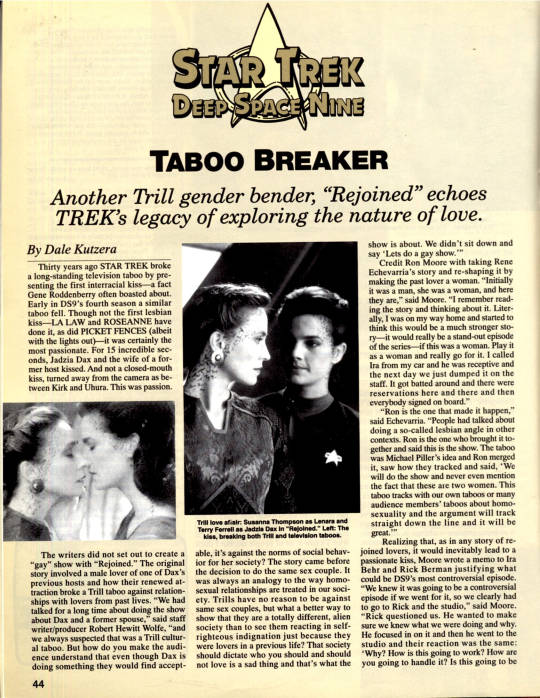
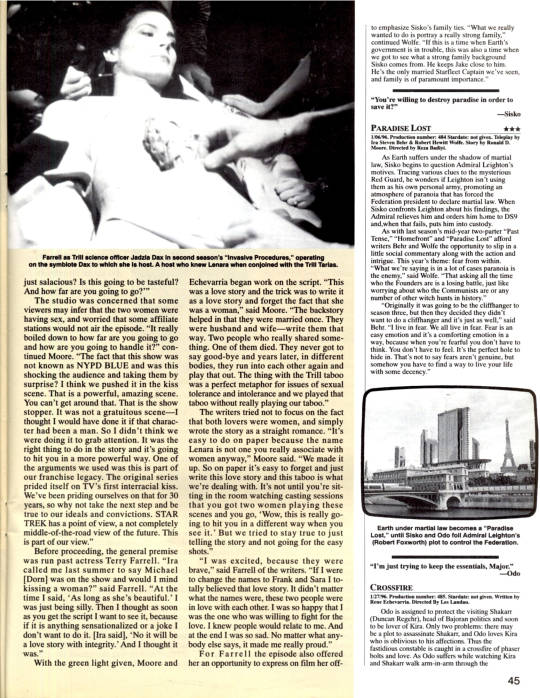
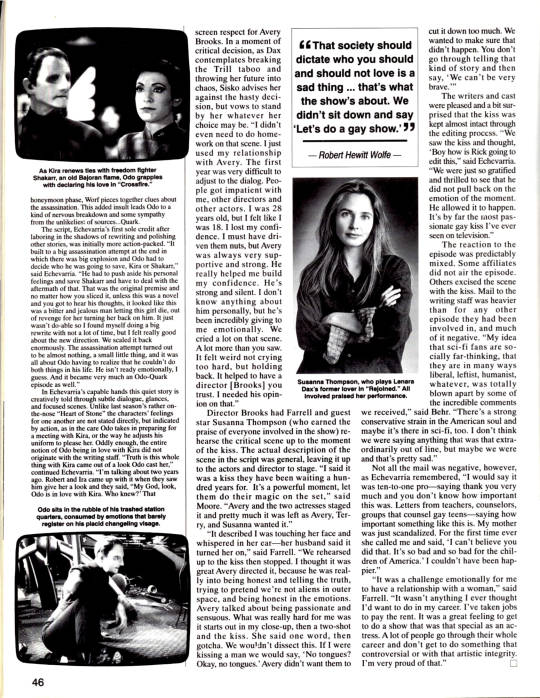
from Cinefantastique Vol 28 #4/5, November 1996
TABOO BREAKER: Another Trill gender bender, “Rejoined” echoes TREK's legacy of exploring the nature of love.
By Dale Kutzera
Thirty years ago STAR TREK broke a long-standing television taboo by presenting the first interracial kiss—a fact Gene Roddenberry often boasted about. Early in DS9’s fourth season a similar taboo fell. Though not the first lesbian kiss—LA LAW and ROSEANNE have done it, as did PICKET FENCES (albeit with the lights out)—it was certainly the most passionate. For 15 incredible seconds, Jadzia Dax and the wife of a former host kissed. And not a closed-mouth kiss, turned away from the camera as between Kirk and Uhura. This was passion.
The writers did not set out to create a “gay” show with “Rejoined.” The original story involved a male lover of one of Dax’s previous hosts and how their renewed attraction broke a Trill taboo against relationships with lovers from past lives. “We had talked for a long time about doing the show about Dax and a former spouse,” said staff writer/producer Robert Hewitt Wolfe, “and we always suspected that was a Trill cultural taboo. But how do you make the audience understand that even though Dax is doing something they would find acceptable, it’s against the norms of social behavior for her society? The story came before the decision to do the same sex couple. It was always an analogy to the way homosexual relationships are treated in our society. Trills have no reason to be against same sex couples, but what a better way to show that they are a totally different, alien society than to see them reacting in self-righteous indignation just because they were lovers in a previous life? That society should dictate who you should and should not love is a sad thing and that’s what the show is about. We didn't sit down and say ‘Lets do a gay show.”
Credit Ron Moore with taking Rene Echevarria's story and re-shaping it by making the past lover a woman. “Initially it was a man, she was a woman, and here they are,” said Moore. “I remember reading the story and thinking about it. Literally, I was on my way home and started to think this would be a much stronger story—it would really be a stand-out episode of the series—If this was a woman. Play it as a woman and really go for it. I called Ira from my car and he was receptive and the next day we just dumped it on the staff. It got batted around and there were reservations here and there and then everybody signed on board.”
“Ron is the one that made it happen," said Echevarria. “People had talked about doing a so-called lesbian angle in other contexts. Ron is the one who brought it together and said this is the show. The taboo was Michael Piller’s idea and Ron merged it, saw how they tracked and said, ‘We will do the show and never even mention the fact that these are two women. This taboo tracks with our own taboos or many audience members’ taboos about homosexuality and the argument will track straight down the line and it will be great.”’
Realizing that, as in any story of rejoined lovers, it would inevitably lead to a passionate kiss, Moore wrote a memo to Ira Behr and Rick Berman justifying what could be DS9’s most controversial episode. “We knew it was going to be a controversial episode if we went for it, so we clearly had to go to Rick and the studio,” said Moore. “Rick questioned us. He wanted to make sure we knew what we were doing and why. He focused in on it and then he went to the studio and their reaction was the same: “Why? How is this going to work? How are you going to handle it? Is this going to be just salacious? Is this going to be tasteful? And how far are you going to go?’”
The studio was concerned that some viewers may infer that the two women were having sex, and worried that some affiliate stations would not air the episode. “It really boiled down to how far are you going to go and how are you going to handle it?" continued Moore. “The fact that this show was not known as NYPD BLUE and was this shocking the audience and taking them by surprise? I think we pushed it in the kiss scene. That is a powerful, amazing scene. You can’t get around that. That is the show stopper. It was not a gratuitous scene—I thought I would have done it if that character had been a man. So I didn’t think we were doing it to grab attention. It was the right thing to do in the story and it’s going to hit you in a more powerful way. One of the arguments we used was this is part of our franchise legacy. The original series prided itself on TV’s first interracial kiss. We've been priding ourselves on that for 30 years, so why not take the next step and be true to our ideals and convictions. STAR TREK has a point of view, a not completely middle-of-the-road view of the future. This is part of our view.”
Before proceeding, the general premise was run past actress Terry Farrell. “Ira called me last summer to say Michael [Dorn] was on the show and would I mind kissing a woman?" said Farrell. “At the time I said, ‘As long as she’s beautiful.’ I was just being silly. Then I thought as soon as you get the script I want to see it, because if it is anything sensationalized or a joke I don’t want to do it. [Ira said], ‘No it will be a love story with integrity.’ And I thought it was.”
With the green light given, Moore and Echevarria began work on the script. “This was a love story and the trick was to write it as a love story and forget the fact that she was a woman,” said Moore. “The backstory helped in that they were married once. They were husband and wife—write them that way. Two people who really shared something. One of them died. They never got to say good-bye and years later, in different bodies, they run into each other again and play that out. The thing with the Trill taboo was a perfect metaphor for issues of sexual tolerance and intolerance and we played that taboo without really playing our taboo."
The writers tried not to focus on the fact that both lovers were women, and simply wrote the story as a straight romance. “It’s easy to do on paper because the name Lenara is not one you really associate with women anyway,’’ Moore said. “We made it up. So on paper it’s easy to forget and just write this love story and this taboo is what we’re dealing with. It’s not until you’re sitting in the room watching casting sessions that you got two women playing these scenes and you go, ‘Wow, this is really going to hit you in a different way when you see it.’ But we tried to stay true to just telling the story and not going for the easy shots.”
“I was excited, because they were brave,” said Farrell of the writers. “If I were to change the names to Frank and Sara I totally believed that love story. It didn’t matter what the names were, these two people were in love with each other. I was so happy that I was the one who was willing to fight for the love. I knew people would relate to me. And at the end I was so sad. No matter what anybody else says, it made me really proud.”
For Farrell the episode also offered her an opportunity to express on film her off-screen respect for Avery Brooks. In a moment of critical decision, as Dax contemplates breaking the Trill taboo and throwing her future into chaos, Sisko advises her against the hasty decision, but vows to stand by her whatever her choice may be. “I didn’t even need to do homework on that scene. I just used my relationship with Avery. The first year was very difficult to adjust to the dialog. People got impatient with me, other directors and other actors. I was 28 years old. but I felt like I was 18. I lost my confidence. I must have driven them nuts, but Avery was always very supportive and strong. He really helped me build my confidence. He’s strong and silent. I don’t know anything about him personally, but he’s been incredibly giving to me emotionally. We cried a lot on that scene. A lot more than you saw. It felt weird not crying too hard, but holding back. It helped to have a director [Brooks] you trust. I needed his opinion on that.”
Director Brooks had Farrell and gueststar Susanna Thompson (who earned thepraise of everyone involved in the show) rehearse the critical scene up to the momentof the kiss. The actual description of the scene in the script was general, leaving it up to the actors and director to stage. “I said it was a kiss they have been waiting a hundred years for. It’s a powerful moment, let them do their magic on the set,” said Moore. “Avery and the two actresses staged it and pretty much it was left as Avery, Terry, and Susanna wanted it.”
“It described I was touching her face and whispered in her ear—her husband said it turned her on,” said Farrell. “We rehearsed up to the kiss then stopped. I thought it was great Avery directed it. because he was really into being honest and telling the truth, trying to pretend we’re not aliens in outer space, and being honest in the emotions. Avery talked about being passionate and sensuous. What was really hard for me was it starts out in my close-up, then a two-shot and the kiss. She said one word, then gotcha. We wouldn’t dissect this. If I were kissing a man we would say, ‘No tongues? Okay, no tongues.’ Avery didn't want them to cut it down too much. We wanted to make sure that didn't happen. You don't go through telling that kind of story and then say, ‘We can’t be very brave.’”
The writers and cast were pleased and a bit surprised that the kiss was kept almost intact through the editing process. “We saw the kiss and thought, ‘Boy how is Rick going to edit this,” said Echevarria. “We were just so gratified and thrilled to see that he did not pull back on the emotion of the moment. He allowed it to happen. It's by far the most passionate gay kiss I've ever seen on television.”
The reaction to the episode was predictably mixed. Some affiliates did not air the episode. Others excised the scene with the kiss. Mail to the writing staff was heavier than for any other episode they had been involved in, and much of it negative. "My idea that sci-fi fans are socially far-thinking, that they are in many ways liberal, leftist, humanist, whatever, was totally blown apart by some of the incredible comments we received,” said Behr. “There’s a strong conservative strain in the American soul and maybe it’s there in sci-fi, too. I don’t think we were saying anything that was that extraordinarily out of line, but maybe we were and that's pretty sad.”
Not all the mail was negative, however, as Echevarria remembered. “I would say it was ten-to-one pro—saying thank you very much and you don’t know how important this was. Letters from teachers, counselors, groups that counsel gay teens—saying how important something like this is. My mother was just scandalized. For the first time ever she culled me and said, ‘I can't believe you did that. It's so bad and so bad for the children of America.’ I couldn't have been happier.”
“It was a challenge emotionally for me to have a relationship with a woman,” said Farrell. "It wasn't anything I ever thought I’d want to do in my career. I've taken jobs to pay the rent. It was a great feeling to get to do a show that was that special as an actress. A lot of people go through their whole career and don’t get to do something that controversial or with that artistic integrity. I’m very proud of that.”
#ds9#trek magazines#cinefantastique#ep: rejoined#terry farrell#ron moore#rene echevarria#ira steven behr#OH SO THAT'S WHERE 'I ASKED HER HUSBAND WHAT TURNED HER ON' COMES FROM#i love interviews with farrell because#1) she will hype up avery brooks and#2) she will candidly admit to the WILDEST things...........#i love the can do attitude of some straight women tbh. inspirational.#jadzia dax
166 notes
·
View notes
Note
what exactly is Aang's toxic masculinity that you're talking about? there are no examples of such behavior on his part in the show. he is not an ideal person, he is a child who sometimes behaved incorrectly, just like all the other children in the show (Katara, Toph, Sokka), and this is normal.
in addition, we see how he regrets some of his wrong actions and gets better, while Zuko does not regret his toxic behavior, doesn't apologize and doesn't face the consequences of his behavior (racist jokes about Aang, demands that Katara forgive him as if he has the right to her forgiveness, an attack on Aang to "teach him a lesson" and many other things).
Hi anon, thanks for the ask! This is a very good illustration of what I was talking about in this post when I mentioned that I feel toxic men are overlooked more often for appearing “nice” than they are for being conventionally attractive.
No examples of toxic behavior in the show? What do you call this then?
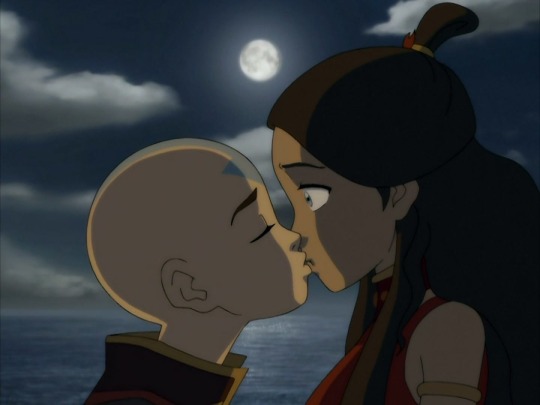
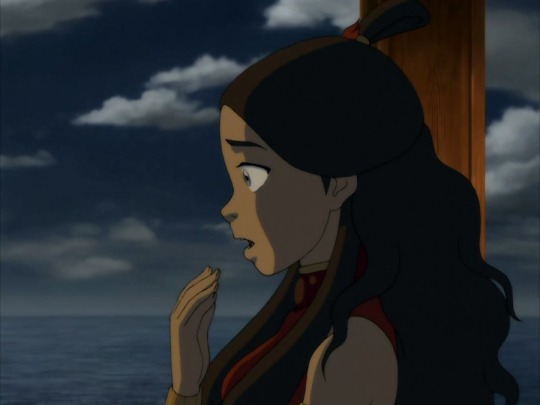
I know what I (and the law) call it:

But you see, he’s “nice” right? This is just a misbehaved child, as you put it? Yah, no. He knew better and still did it because he was possessive; this whole interaction started because he was jealous that an actress playing Katara was interested in men other than him. And the show proceeded to frame the situation in a way that made Aang sympathetic, despite being the aggressor and the one behaving irrationally. How much more “toxically masculine” can you get than that? But he put on a flower crown once so we’re supposed to think he’s a soft uwu feminine boi (even though he was absolutely enraged that a female actress played him).
I also find it very interesting that you describe Katara and Sokka as “children” while Zuko is omitted from that list despite being the same age. Are you admitting you agree he’s more mature, or are you admitting that you hold him to different standards?
But, anyways. You asked about toxic behavior on Aang’s part, which I’ll get further into now that the most egregious example is out of the way.
Let’s break down what you consider unforgivably toxic behavior on Zuko’s part and compare it to Aang’s behavior in similar situations.
1. “Racist” jokes
I’m guessing this is made with reference to the “Air Temple preschool” comment. How exactly is this racist? In context, Aang is the one trying to force his beliefs on others, and Zuko makes this comment to a) tell him to back off and b) point out that Aang is, in fact, a child who doesn’t have any business telling Katara how to feel.
This point is particularly interesting to me, because it implies that the simple fact that Zuko doesn’t agree with the philosophy of Aang’s culture makes him racist. By this logic, Aang is also racist against Katara’s culture, because he clearly disagrees with her philosophy and is openly telling her that his culture is morally virtuous over hers. And well. That’s even more believable considering Aang’s previous reactions to Water Tribe culture.
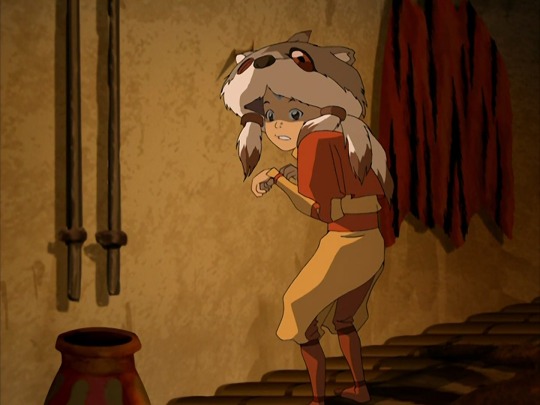
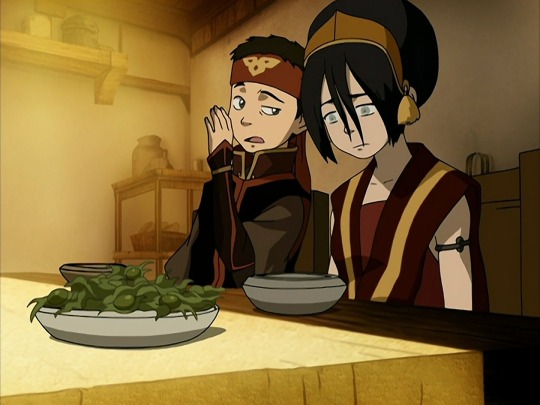
Ah, yes. Playing with a cultural artifact like it’s a toy because you were upset about not being the center of attention for once, and telling everyone how disgusting you think cultural food is, what great ways to show the supposed love of your life how much you respect her culture!
I know your response to this point would be something like “uwu but he’s a kid he didn’t knowww” ok well. The same logic can be applied to any alleged “racism” on Zuko’s part.
2. “Demanding” forgiveness
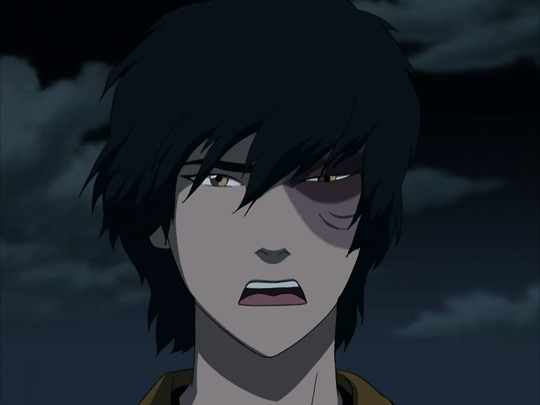
Zuko: What can I do to make it up to you?
Ah, yes. How demanding of him. He’s clearly so self-centered and only thinking about his own values and agenda here.
It’s not like he…
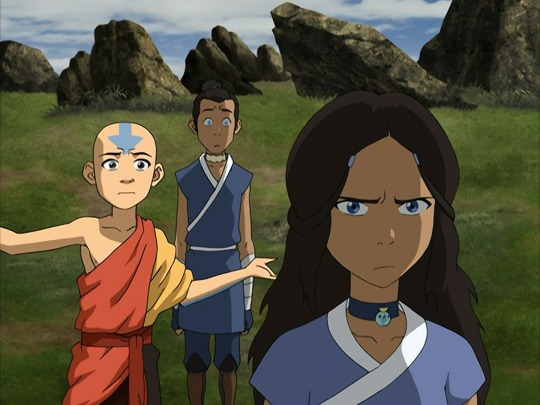
…told his friend how she’s allowed to process her grief and try to impose his own morals…

…or demanded to know if his crush liked him back, wouldn’t accept “no” as an answer, and forced a kiss on her…
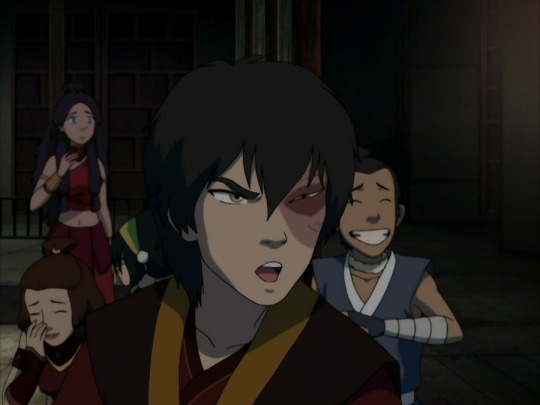
…or told an abuse victim he was wrong to want to kill his abusive father for trying to commit a genocide…
…oh, um. Yeah. Sorry, but after actually watching the show it’s very clear to me which character doesn’t seem to regret or see the flaws in any of his actions at the end of the show, which is when all of these examples took place.
3. Training in the finale
“Attacking Aang to teach him a lesson” … wow, that’s a very dishonest way of phrasing that situation. I’m impressed, I have to say. I’ve seen lots of dumb takes from Aang stans over the years but this is a new one.
Well, luckily I actually watched the scene in context, so my reaction was the same as all the other characters’ reactions in canon when they learned the context behind this “attack”:
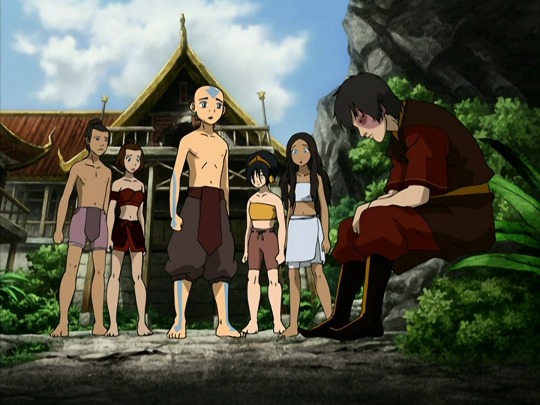
They agree with him. Yeah. Obviously, when nobody is taking training seriously when the world is about to literally go up in flames, you might need to do something to get their attention.
“But it was dangerous!” you might argue. Well… yeah. When magic and bending is in the equation, training in the Avatar universe has been shown to be somewhat dangerous at times. As an example, from this very same episode, Toph very nearly smashed Sokka with a giant flaming rock. That was way closer to hurting someone than Zuko was in this incident. If you’re going to fault characters for making their training exercises too dangerous, I guess Toph is mega cancelled.
Now back to Aang. What was his reaction in this situation? How did he react to the end of the world being days away? He ran away with absolutely no plan. Just like he did at the very beginning of the show.
I mean, think about it. This is a critical flaw (and toxic trait) in Aang that is literally never addressed, because he starts and ends the show the exact same way: he’s faced with a problem, he runs away from it, then he’s saved by an in-universe equivalent of an Act of God. Wowie, such great character development. Not fixing your core flaw and having a mythical plot device materialize into existence to solve your problems for you. Aang’s whole arc is a big blah, because the writing fails to address any of his flaws or have him meaningfully question any of his values.
Meanwhile, Zuko has consistently been a fan favorite because he’s the opposite. His flaws are meaningfully addressed, he does admit he’s wrong and fix his flaws, and his character shows a critically acclaimed change throughout the show. His arc is written so well that despite being a cartoon character, Zuko is widely considered the poster child for a good redemption arc across all forms of media.
So anyways, miss me with the double standards… there is a reason why Zuko is the fan favorite, and it’s not just his abs 🔥
677 notes
·
View notes
Text
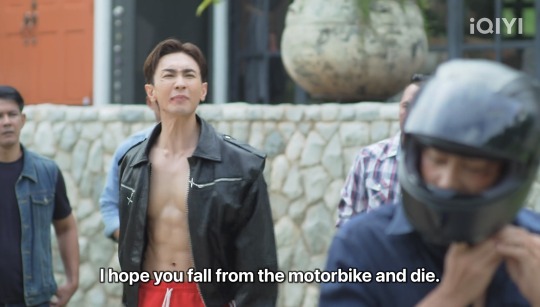





out of context laws of attraction (4/?)
#laws of attraction the series#out of context laws of attraction#he was my favorite part of this show which says a lot since charn was there#we need a nawin centric prequel like yesterday
99 notes
·
View notes
Text
Desi Girl
Pairing: Carlos Sainz jr x indian!reader
Context: Attending a desi wedding with bae
ps: No specific faceclaim, i got every image from pinterest. Desi girls need some love too and i love carlos so i thought he would be the perfect fit for this.

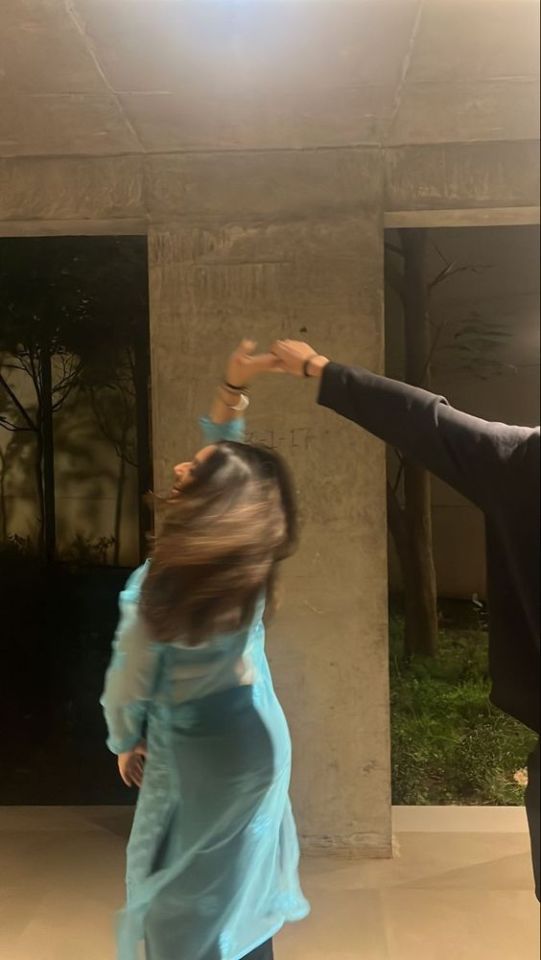

yourusername



yourusername shaadi (wedding) time!!
ps; not my shaadi, my sister's
tagged: carlossainz55
landonorris where's my invite
yourusername remember the time we invited you for diwali and you almost burned yourself bc YOU INSISTED TO LIGHT FIRECRACKERS WITH MY BROTHER landonorris no regrets yourusername you almost died dummy landonorris like i said no regrets carlossainz55 .... ynloversz i love how carlos is so used to their banter that he stays out of it lest he too face the wrath of y/n yncarlos tired older sister and annoying younger brother dynamic ynmylove the fact that she already has a younger brother who annoys tf outta her and now she gotta deal with lando and her lil bro mywifeyn my girl cant catch a break😭
charlesleclerc i wanted to come too...
yourusername you can come when we get married carlossainz55 what she said^^^
yummyyn they’re so in love😩😩😩
carlitoyn mother is mothering; daddy is daddying
ynwifey shes so so mommy😩
randohater yeah must be fun mooching off your millionaire bf
ynloversz oh someone hold me back im boutta get violent
mywifeyn its always these ignorant americans smh 🤦
ynmyqueen her family is hella rich and practically run almost everything in India so before hating on someone who is way richer and prettier than you, do your research cuz this is embarrassing for you.
f1wags

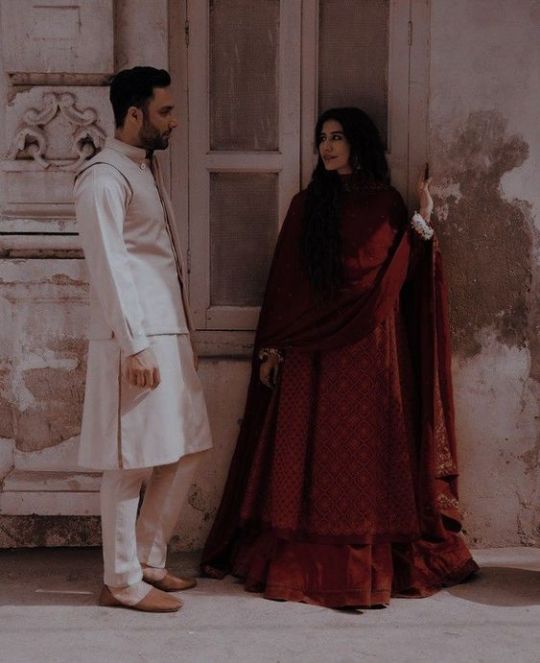
f1wags Carlos Sainz and his girlfriend Y/n Y/l/n in Jaipur, Rajasthan at her cousin sister's wedding. Both looking quite good in traditional indian outfit.
carlito55 OMG CARLOS IN A KURTA. THIS IS NOT A DRILL I REPEAT CARLOS IN A KURTA
carlyn MY JAW DROPPED. THEY LOOK SO GORGGGGG
Ynfanacc mother slaying as usual
yourusername
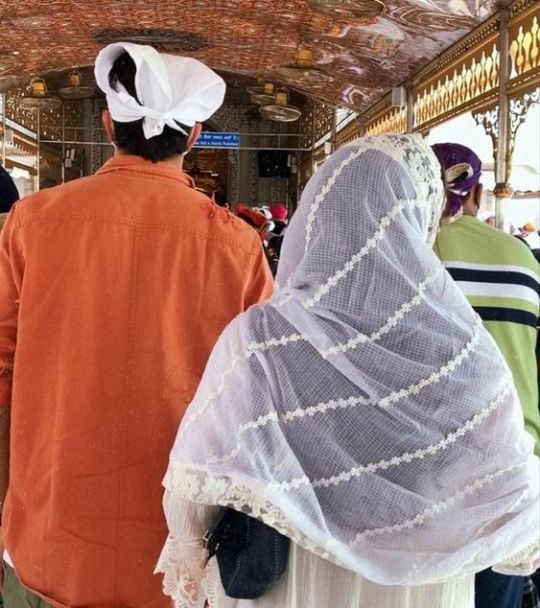


youusername with meri jaan (my life)🫶
tagged: carlossainz55
ynloversz “meri jaan”🥹
carlitoyn tell me why I’m crying
carlyn they love each other so much I’m crying
carlossainz55 tum meri jaan ho ❤️ (you are my life)
ynwifey Carlos replied in Hindi Oml I’m boutta cry
landonorris did yn help you type this or did you use google translate??😑
yourusername I may have helped a bit
carlossainz55 tu gadha hai (you’re an idiot) landonorris
yourusername now that’s all him, I’m so proud that he’s learning hindi 🥹 (btw my brother taught him that)
yourbrother roasteddd
Ynnnn55 they visited a temple together omlll
ynpyaar (pyaar means love) I literally met them today and they are even cuter and down to earth in real life.
yncarlos I love that even though both of them are really rich they’re still so down to earth which honestly makes them even more attractive
carlitoyn it’s not even just yn, but her entire family is also like that, honestly love her family, they’re such kind souls, it’s no surprise yn is too
carlossainz55
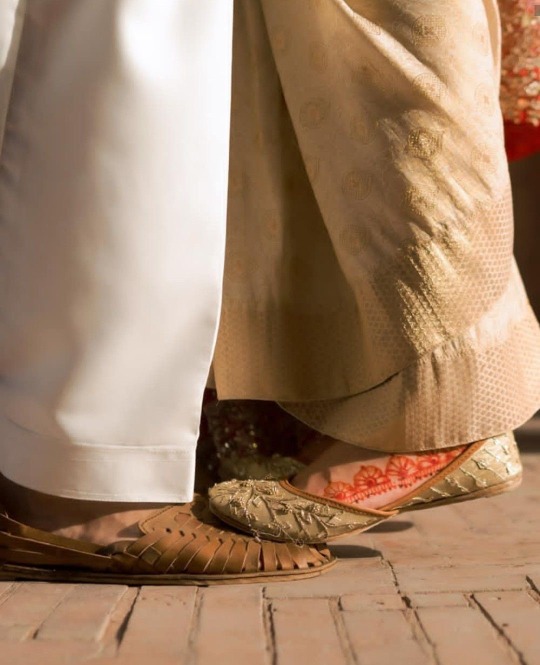

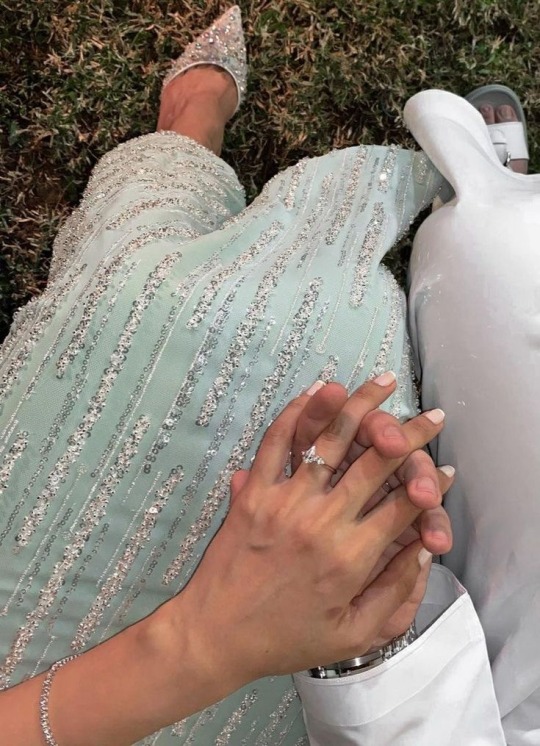
carlossainz55 with mi amor ❤️(my love)
yourusername I love you ❤️
carlossainz55 I love you more baby landonorris i see you have no shame yourusername what is our crime?? landonorris having fun without me yourusername 😐 carlossainz55 😐
yncarlos THE IT COUPLE!!!!
carlitoyn MISS MAAM YOUR OUTFIT!!!! THE HENNA ON YOUR FEET!!! THE FIRST PIC SO CUTE IM GONNA PASS OUT
liked by yourusername and carlossainz55
ynwifey THEM DANCING IS SO ADORABLE
carlossainz55 posted a story
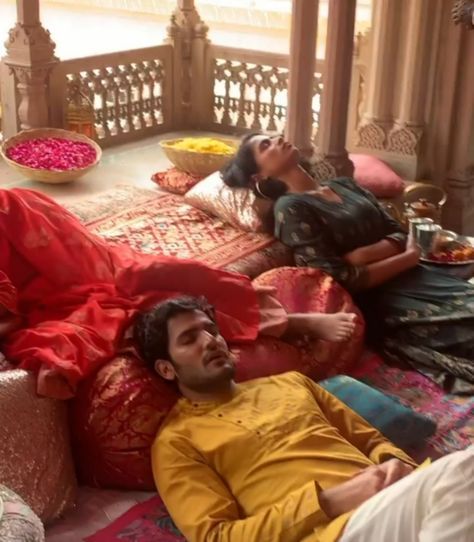
caption: everyone is tired 🫨
yourusername

caption: 🥳🥳
yourusername


caption: Congratulations didi (older sister) and jiju (brother in law)
carlossainz55



carlossainz55 fun couple of days with mi amor
tagged: yourusername
yourusername carlos drank so much chai, he has become a certified indian now🫡
carlossainz55 mazaa aaya (had fun) yourusername Im glad 😘
landonorris better get an invite to y'all's wedding
yourusername of course lando carlossainz55 could be any day now so you better check your mail ynloversz WHAT
carlitoyn always eating with the looks queen 😍
f1wags you guys are a beautiful couple truly ❤️
comments have been limited on this post...
------------------------------------------------------------------------------


author's note: Y'all would not believe how much i enjoyed this. Ive been super inactive because ive been super busy with stuff plus with not wanting to write but hopefully im back and will be writing more stuff, a lot F1 related bc im into F1 rn.
#f1#f1 x reader#formula 1 x reader#carlos sainz x reader#carlos sainz jr#f1 imagine#f1 x you#f1 smau#f1 social media au#formula one imagine#lando norris#charles leclerc
299 notes
·
View notes
Text
pick a card : where you need to take action
choose the image you feel most drawn to.



pile 1
six of swords, nine of cups, the star, ten of wands
this pile is about leaving something behind feeling disappointed. this has costed you and taken a lot from you, but it has also taught you a lot. i feel like this refers to a job or a certain lifestyle. whatever this is, you have decided to leave it behind because it didn't align with your values. even if you feel like time was wasted, this experience has allowed you to acquire the knowledge and skills necessary for your next step. if you're still thinking about leaving something behind but are feeling fearful about it, you should trust your instinct and take action. if you do, the outcome will be extremely rewarding.
the nine of cups indicates that the situation you were in took a lot of mental space and made you forget about the things that actually make you happy. the card represents a man sitting in front of nine cups with his arms crossed and a smirk on his face. you are soon going to reconnect with a practice or motto that you have abandoned. you are going to spend more time nurturing this activity, and that will make you happier because it’s something that you actually enjoy doing.
then we have the star. the star is about taking energy from a source and pouring it to another. it’s associated with Aquarius, the humanitarian. in this context, it means that there is something that you can offer to the collective. maybe you have always wanted to be a creative, or have always wanted to help others in some way, but have been advised against that by your parents or by society in general. the star says that your gifts are not meant to be hidden. you are meant to share them with the world. someone, somewhere, needs to hear the message that you want to spread.
this card is also an encouragement to trust both yourself and the universe. if there's something that you wanna do because it makes you happy, you shouldn’t wait to do it. you shouldn’t postpone happiness, as the future isn’t certain. there’s nothing else more important than feeling good in the present. when you are feeling good, the universe will deliver more experiences that makes you feel good. like attracts like. wealth, health, connection… all of these things will be given to you when you feel happy and fulfilled. if you don’t know about the law of attraction yet, you should learn about it. it will help you to feel more grateful about what you have and also more relaxed about your decisions.
the last arcana suggests that this change of course won’t be easy, though. you will have to give it your all. some people see the ten of wands as a burden that's too heavy to bear. but as the last card of the wand suite, it signifies accomplishment and satisfaction. you will have to put more energy and intention into what you're doing, but the more that you do, the more rewards you will get. the man on the picture carries ten wands home, which represent the trophies he’s earned along the way. he is bringing them home so he can finally rest and enjoy the success he has fought so hard to achieve.
pile 2
seven of cups, queen of swords, nine of cups, temperance
i feel like you are confused about where to focus on energy on. i feel like there are opportunities and options in front of you, and that you don't know which one to choose. so you are asking yourself what it is that you want. is it status, meaning, or connection that you seek ? is it wealth ? some of these paths are dangerous and deadly, as indicated by the snake and weird creature appearing out of the cups. be careful what you wish for, because it might well come true. does any of these paths resonate with the person you're trying to become? will they actually make you grow, or are they just shortcuts to success?
the queen of swords suggests that you can be very decisive and determined. you might be a fixed sign, or have a lot of fixed energy in your chart. once you are sure what the goal is, there is no going back. you give it your all, until you reach your destination. but i feel like you have been influenced by your peers or by society in general to pursue things that aren't really you. you have been walking toward a dead end. the queen is looking straight ahead, with her sword held high. she's ready to cut through the bullshit. the clouds behind her are lifting, meaning that state of confusion is disappearing. you know what you're supposed to do. and you know that you've got what it takes to succeed. all you have to do is to take the step.
once you do, you will be highly satisfied. we can relate the nine of cups to the act of doing what one knows and enjoys doing. you will decide to do something that actually makes you happy, and not another person's idea of happiness. once you do, you will be highly proud of yourself and proud of the thing that you are creating. the joy you will feel will attract even more opportunities for you to be happy.
temperance indicates an equilibrium between water and earth; between the spiritual and the physical. whatever enterprise you are planning to take on, you should know that it is your calling. the angel on the card is enlightened, while the Sun behind him is rising. balance will be restored. you will finally be doing something that you are supposed to do. once you are walking this path, everything will align. you'll feel better and more hopeful about the future.
pile 3
the tower, two of pentacles, nine of wands, ace of wands
i see the destruction of one's fondation, of one's support system. you may have lost a friend, a lover, or a job. maybe they left you. this thing or person meant a lot to you, and you don't know how to go on without them. you might be depressed. you don't feel like you have enough energy or drive to do anything. so you let chances pass by in front of you, feeling stagnant and regretful.
the two of pentacles represent the contemplation of a ressource or opportunity. the character on the image plays with the pentacles, instead of using them. the movement of the pentacles draw a figure 8. you are living in your head and juggling with this idea instead of working actively to make it come true. you have wasted time but it's not too late to start moving. you have a lot of ressources at your disposal, as indicated by the nine of wands, the penultimate arcana of the suite. you have almost arrived at your desired destination. success is near. but you are still looking backward, focusing on the past instead of making the most of your present situation.
the last card of the reading is the ace of pentacles. which is funny as it's the first card of the wand suite. it's about starting another journey, and the infinite potential that comes with it. wands are associated with the fire element, which isn't fearful about new experiences. on the contrary, fire gets excited when new opportunities present themselves because they allow it to spread and expand. whatever opportunity presents itself to you, you should take it because once you do, you could accomplish things you didn't think you didn't think you were capable of. all you have to do is to decide to get moving and things will stat moving. whatever happened is in the past. you might not be able to get it back, but i don't think that you need it to keep going on your way. you still have the most important weapon in your arsenal, and that arsenal is you.
94 notes
·
View notes
Text
i finally articulated my opinion on my "is gerard way doing drag" question. my definition of drag is when a person impersonates, exaggerates, or appropriates a mode of gender expression. drag can be artistic or political (or both). drag can be an identity. drag and transgender identity are confused as the same thing. for some, it is. what is considered cross dressing can also be considered drag. it's important to note that drag is essential to queer culture, and how the us government harasses queer people through cross dressing, and now anti-drag, laws. we wouldnt be here talking about pop artists doing drag without drag performers and nonbinary-trans-gnc people.
to some people, a self-identified man in a female-identified dress is drag. "cross dressing" depends on cishet norms. queer people, especially nonbinary-trans-gnc people, have called to dismantle the assignment of gender to clothing. under that lens, a man in a dress is just a man in a dress -- for it to be drag, context and intent matters. that's how you get women doing female drag, or androgynous people doing what gerard way's been doing this last year on tour.
in asking "is gerard way doing drag?", im assigning importance to the topic. does it matter? within my understanding, drag is about intent and context as much as gender presentation. intent and context is what makes something important. therefore: understanding why the question is important solves it.
male music artists have a long history of cross dressing and doing drag. there's a good chance plugging any dude into a search engine with "drag" or "skirt" will bring something up. bowie, queen, nirvana, manic street preachers, placebo. here's a list. newer artists: lil nas x, harry styles, anthony green, pete wentz, young thug. some are impersonating female caricatures, some are masculinizing female clothes (long, ill-fitting, straight). some, like molko and lil nas, wear feminine clothes without exaggerating or masculinizing. gerard is in that same grey area.
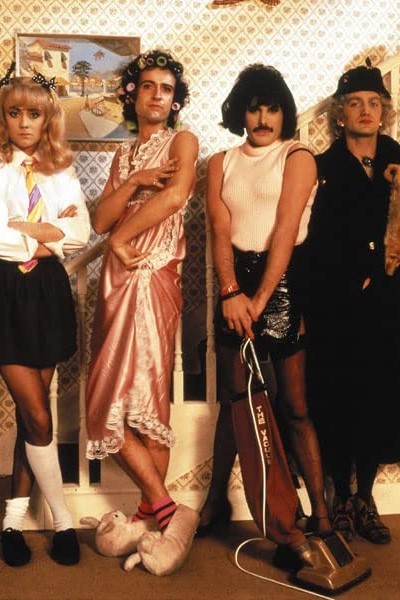



male music artists have a long history of cross dressing and doing drag -- photos: "i want to break free" mv by queen (1984) / placebo in london (oct 1998) / lil nas x at audacy beach festival (dec 5, 2021) / fall out boy at rock for people (june 17, 2022)
all that history is why it was so weird when kerrang called gerard's riot fest "dress and heels" "a compelling show of contrarian anti-rock star eccentricity". it is not anti-rock star, at least not as described. it may be compelling, contrarian, and eccentric, but no reviewer really cares to analyze why. the closest they get is by identifying non-binary connection (them.us) and its relation to the "minefield that is American gender politics today" (latimes.com).
fans were struck by way's outfits for a lot of other reasons.
1. we have to get it out of the way that they just looked hot -- gerard is perpetually attractive, skirts are pretty. easy equation.
2. he has a long history of gender nonconformity. more on that in my #mcr queer studies tag. gerard is a 45 year old famously androgynous person who doesnt do labels, aligns himself with gender nonconformity (2014 reddit ama, 2018 advocate article, 2015 he/they tweet), and doesnt seem to care to be known as a man.
3. the tour outfits were well-fitted. many were crafted by skilled designer marina toybina and her team. which leads to ->
4. the outfits were very casual and very feminine. as mentioned, most men opt for masculine, ill-fitting skirts. which is to say they are NOT showing leg and they are definitely not showing ass. gerard doesnt steer clear from shortness or tightness or movement. he also dresses in ways people dress day to day -- the miniskirt is as casual as the shorts as casual as the jeans. there's some discussion to be had about what casual means -- he could be imitating expected presentation or just using basics, like his frequent shirt and pants.



the miniskirt is as casual as the shorts as casual as the jeans -- photos: firefly music festival (sept 23, 2022) / uncasville (sept 1, 2022) / eden project night 1 (may 16, 2022)
5. there was variety. many outfits, many types. he wasnt just doing pure femininity. some looks were high concept, some low concept. some gendered, some genderless. some feminine, some masculine. it was playful. its honesty evident in its fluidity yet cohesiveness. expanded in the next points ->
6. they incorporate elements of masculinity and gender neutrality concurrent with the feminine. his aggressive, energetic performance style often doesnt mind what people are seeing when his skirt lifts or shirt droops. he has little to no make-up -- if he does, it's stage and not glam. the closest he gets is the agender black swan look at boston night 1, the stage contour at wwwy night 3, and dubious lipstick at firefly. he also maintains the same hairstyle: barely styled, not straightened-curled. pinned a few times, gelled back some other times.



he has little to no make-up -- if he does, it's stage and not glam -- photos: boston night 1 (sept 7, 2022) / when we were young night 3 (oct 29, 2022) / firefly music festival (sept 23, 2022)
7. the character outfits weren't caricatures, like green's sleazy hooker or queen's uptight housewives. gerard's characters were appropriated but not exaggerated. cheerleader, nurse, manson girl, jackie o, princess diane, st joan. all figures of pop culture. he wore them as they were. even comparing green and way's similar white-green cheerleader costumes there's a difference in presentation. green wears long leggings, way wears shorts. green's costume is based on a stranger things character, way's is a custom remade vintage outfit. green exhibits the masculinization of feminine clothes which way subverts. this comparison highlights what makes way's outfits different, and therefore exciting to talk about.


green exhibits the masculinization of feminine clothes which way subverts -- photos: saosin in garden grove, ca (oct 27, 2022) / mcr in nashville, tn (aug 23, 2022)
8. and when he played with masculinity, it was in a way that was dubbed "boydrag". the new jersey night 2 casino singer look was a dramatic caricature that heightened masculine features until they were pure style... the defintion of camp. he had a mustache -- thin like john waters or a confirmed bachelor, and drawn on with eyeliner. he had a suit -- a pink-gold, glittery woman's cut jacket with a glittery bowtie and pleated shirt. the dramatic flair is accentuated by the black eye make-up, the frank sinatra "my way" cover, the drum tag: "the house always wins".


the defintion of camp -- photos: new jersey night 2 (sept 21, 2022) 1 / 2
when i asked which outfits others considered drag, all replies identified the casino singer and jackie o as drag and the rest as "just clothes". this relation made me understand why the rest couldnt be drag despite all the connections i talked about above. the jackie o outfit doesnt exaggerate the source like casino singer, but the source itself is both highly dramatic and highly gendered. cheer is gendered but not highly dramatic, st joan dramatic but not highly gendered. diane is gendered and dramatic, but not highly. the list goes on and on. it's a fine line. especially cheer could tip into drag for me.


but the source itself is both highly dramatic and highly gendered -- photos: mcr at riot fest (oct 12, 2022) / jackie kennedy onassis (jan 3, 1971)
if drag is understood in this way, simply wearing gendered clothes isnt drag. the look itself has to be about the performance of gender, however that may be presented. that’s the importance of classification. we can see what the artist is doing.
1K notes
·
View notes
Text
Seeing you with makeup
Context: Law seeing you wear makeup for the first time



•When Law first sees you wearing makeup, his eyes widen slightly in surprise. He’s not used to seeing you with it, but he finds the change intriguing and captivating.
•He takes a moment to appreciate the subtle enhancements it brings to your features. The slight shimmer on your eyelids and the way your lashes stand out make your eyes even more mesmerizing.
•Despite his stoic demeanor, a hint of admiration shines in his eyes as he gazes at you. He can’t help but find you even more beautiful than before, and he silently wonders why you don’t wear makeup more often.
•“You look nice,” Law says, his voice surprisingly soft. He wants to let you know that he appreciates the effort you put into your appearance.
•You blush at his compliment, feeling slightly self-conscious under his scrutiny. However, the way he looks at you makes you feel special and seen.
•Throughout the day or evening, Law can’t help but steal glances at you. He finds himself drawn to the small details of your makeup, like the way your lips have a subtle sheen or the delicate blush on your cheeks.
•As time goes on, he becomes more accustomed to seeing you with makeup, and he starts to realize that he quite likes it. He’s not one to express his emotions openly, but he feels a sense of pride having you by his side, looking radiant.
•Later, when you’re alone together, Law might compliment you again, this time in a more casual manner. “You should wear makeup more often,” he might say, giving you a rare smile that sends butterflies through your stomach.
•He might ask you about makeup, wanting to learn more about why you chose to wear it for the occasion and what other looks you like. He’s genuinely curious and wants to understand your preferences.
•Seeing you wearing makeup for the first time brings a new layer of attraction to your relationship. Law finds himself falling even more in love with you, appreciating your beauty and confidence in trying something new.
•From that moment on, you might catch him stealing glances at you more often, secretly admiring the way makeup enhances your already captivating features. And while he might not say it out loud, you can tell that he genuinely likes seeing you with makeup and that he’s drawn to your natural beauty in every form.

©𝐘𝐀𝐘𝐎𝐎𝐍𝐀— Any sign/evidence of plagiarism made from outside this name will be dealt with by whatever means necessary. Legal action may occur if non fanfiction works are plagiarized.
#one piece x reader#op x reader#one piece headcanons#op hcs#op headcanons#anime x reader#op x y/n#one piece fluff#op x you#op heart pirates#op fluff#op fic#one piece x you#one piece#one piece x y/n#one piece scenario#trafalgar law x oc#trafalgar d law x reader#law x reader#law x y/n#law headcanons#trafalgar law headcanons#anime hcs#anime x y/n#anime headcanons
423 notes
·
View notes
Text
Queer lit of the 1800s: Two gay Victorian vampire stories you've probably never heard of
So, I have this post in the works tackling that all-important question: just why are there so many gay vampire stories? But in writing it, what was supposed to be a brief tangent about a couple of little-known m/m vampire stories from all the way back in the late 1800s era… started expanding into something not-so-brief, as such tangents are prone to do.
But what the hell, the internet tells me it's queer history month: clearly the only solution is to give those stories their own post, where my tangent can spin out as far as it likes!

Now, if you know anything about Victorian vampire literature or the lesbian vampire genre, you’ve probably already heard about Carmilla, by Sheridan le Fanu (1872), the world’s very first (known) lesbian vampire story. To this day, it's easily the second best-known and widely adapted tale in all the Victorian vampire canon (after Dracula, obviously) – and it probably deserves to be too.
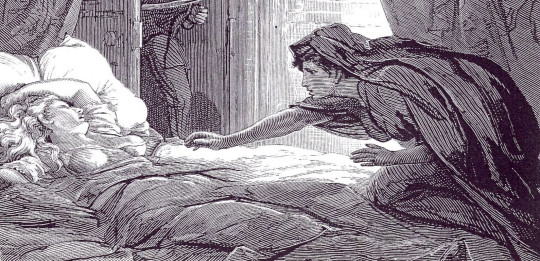
But this is not a post about Carmilla, because Carmilla is not the only gay-vampire-story written way back in the Victorian era. It's not even the least subtle gay-vampire-tale.
There are (at least) two others, both featuring male/male vampire/human pairings. And whether or not they ‘deserve’ to be remembered in the same breath as Carmilla, they’re both fascinating works in their own rights: Manor, by Karl Heinrich Ulrichs (1884) – one of the world’s first gay activists – and A True Story of a Vampire, by Count Eric Stenbock (1894).
You can read both online. A True Story of a Vampire is long out of copyright and can be found on Gutenberg (Carmilla is too, if you're interested), and many other places. Manor has been translated into English only much more recently, but you can still get hold of it in pdf form, or buy it in ebook format. But if what you really want are some summaries, and/or whole lot of extra context and analysis to go with the stories themselves, I've got you covered below.
Manor (1884), Sailor Stories, and Karl Heinrich Ulrichs
We’ll start with Manor, since it was published ten years before our other example, and because I’m not quite cruel enough to leave you going "wait, did you really just tell me there was a legit gay activist writing vampire slashfic in his free time way back in the 1880s?" while I ramble on about the other story first. We'll start with the author himself, because his own story is at least as interesting as any fiction he ever published.
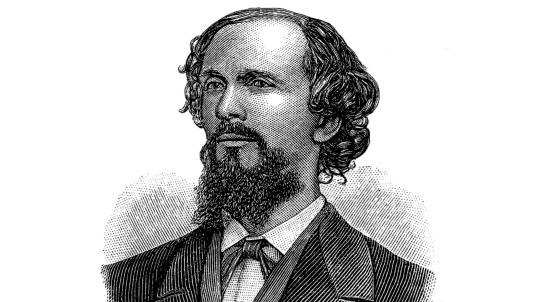
Born in Germany in 1825, Karl Heinrich Ulrichs knew from a young age that he was attracted to men. He trained in law, but wisely resigned before he could be fired in 1854 when his proclivities came to the attention of his superiors. Most in his position would've redoubled their efforts to hide; Ulrichs spent the next several years joining societies dedicated to science and literature and developing his own theories about non-hetero orientations, before officially coming out to his family in 1862.
He was just getting started. By 1867, he was ready to come out to the whole world.
Ulrichs is far from the first gay man to recognise his attraction without shame and find society in like-minded individuals ‒ but he may well be the very first to come out voluntarily and publicly, and advocate for the decriminalisation of homosexuality. And when I say "publicly" what I mean of course is, "in a formal address to the Congress of German Jurists." He was shouted down, but it was still a staggering act of bravery for a man of his time. It would still be a staggering act of bravery in many parts of the world today.
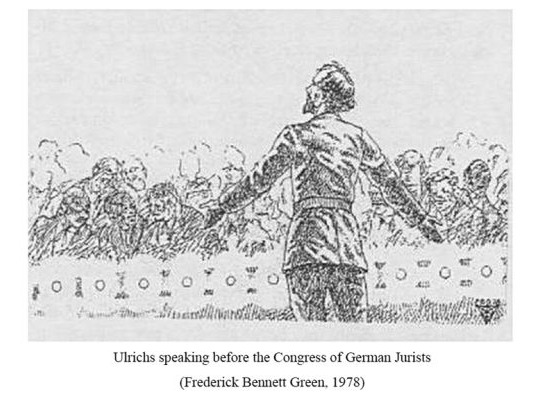
Undaunted by his reception, Ulrichs would also publish a dozen booklets advocating for rights for his community between 1864 and 1879, framing their sexuality as natural, inborn and wholly benign. In 1880, after multiple arrests for his political advocacy, he left Germany for self-imposed exile in Italy, where he would remain until his death in 1895. But it's during this period that he published some poetry, as well as Sailor Stories, a collection of four short stories inspired primarily by Norse mythology, including Manor (which we’ll get to, don’t worry).
Though Ulrichs saw little legal success in his lifetime, through modern eyes, his greatest failure might be only that he was so far ahead of his time. When he began writing and advocating, the word 'homosexuality' didn't even exist yet ‒ he himself used the term 'Urnings' for gay men, eventually coining terms for variations like 'Mannling' and 'Weibling' (gay male equivalent of 'butch' and 'femme') as well. He also came to recognise bisexuality, lesbian attraction, and even intersex conditions, theorising that all resulted from some combination of male and female characteristics developing in the same individual, as the available knowledge on embryonic development suggested might be possible. For a guy with only Victorian era science to work from, that's still remarkably close to the modern consensus today.
Nor did Ulrichs' work die with him. His writings would go on to inspire and be republished by gay rights movements that followed him ‒ including the work and advocacy of Magnus Hirschfeld, who created what may be the world's first trans-affirming clinic. Even in his own time, responses from his own readers show much his work meant to them, reassured at last that they weren't alone.
So how does a German activist from the 1880s find himself publishing gay vampire fiction based on Norse mythology while living in exile in Italy? I only wish I knew. My sources suggest his main goal with Sailor Stories was to publish something that would sell. Unsurprisingly, given the subject matter it seems to have sold very little. Manor is the third of four short tales, and by far the gayest of them all. It's also (IMHO) by far the best, and the most interesting.

Set in a Norwegian fishing village, Manor tells the story of the romance between a 15-year-old boy called Har, and the titular Manor, a sailor 4 years his senior, who rescues Har from the wreck which killed his father. In the days that follow, the pair become close, and Manor takes to swimming across the bay on summer evenings to visit Har at his home. And so they meet whenever they can, until tragedy strikes again, and Manor is killed in a shipwreck near the coast, leaving Har inconsolable with grief.
But this being a vampire story, in the nights after Manor’s death, something is seen swimming across the bay to Har’s home, just as Manor used to do. Har is visited night after night by the spectre of his beloved, who lies beside him in bed, strokes his cheek with cold hands, and kisses him with icy lips, draining his blood from his heart, "like an infant at its mother’s breast." Har himself awaits each night with mixed joy and fear, longing to see Manor again, even in such a form.
As Har weakens, the villagers attempt to trap Manor in his grave by hammering a stake through his body, but he continues to visit Har nonetheless, now sporting a gaping wound in his chest. The villagers return with a new stake, widened at the base like a giant nail, and finally, Manor is restrained in his grave. But it’s too late for Har: weakened and heartsick, he dies, begging only that he should be buried beside his beloved at last. Neither rise again.
Though I can’t speak to how it reads in the original German, in translation, Manor is relayed in largely workmanlike prose. Its tale is short, simple, and sad – but so much about it fascinates me all the same.

(Draugen, Theodor Kittelsen, 1891)
There’s the incorporation of elements you might better recognise from Norse draugr folklore – revenants more typically associated with deaths at sea, or charged with guarding their own graves ‒ but still far more closely related to the vampires of Slavic mythology than most people probably realise. Manor is also one of painfully few stories which clearly recognises what is surely the original purpose of hammering a stake through a vampire’s body: not to kill it, but to hold the creature down and prevent it from leaving its grave. As a hopeless vampire-nerd (I've presented panels at conventions about this stuff, it's dangerous to get me started), I can’t tell you how much I love those aspects of this story.
But above all, Ulrichs’ tale captures what might be one of the oldest and most traditional versions of the folkloric vampire: the spectre of a lost loved one, and the potent mixture of fear and twisted longing thus inspired, that the weight of their loss might drag you down into death to join them. Many ‘real’ tales of vampirism have been inspired by outbreaks of wasting diseases like consumption, working their way through a family, one member at a time. But in Har’s case, it is clearly grief as much as Manor’s physical visits that claims him. He loves Manor so much that he welcomes his lover back, even as a revenant. In his own way, Har too is cursed by Manor’s death to wander the world like the walking dead, until finally reunited with his lover once more.
Nowadays, tragic love stories like this tend to get an eye roll from a lot of the queer community. The old ‘bury your gays’ trope has been done to death, and we’re largely sick of being told that noble suffering is the best we can hope for. But it’s notable nonetheless that Manor’s sexuality has no bearing on his death, and little about the story would change were Har female. It's far from clear if the rest of the village even recognises Har and Manor's love for what it is, let alone whether they'd disapprove ‒ after all, vampires will often go after friends and acquaintances when lovers and family members are exhausted. As such, it’s hard to read the village’s attempts to keep Manor in his grave as a simple matter of prejudice. They're also genuinely trying to save Har's life.
And yet, the way Har keeps the undead Manor’s visits a secret, even begging for the stake to be removed so they can resume, echoes the real experiences of so many gay and lesbian couples far too clearly to be accidental. And however disturbing to a contemporary audience, Har’s willingness to follow his lover to the grave leaves little doubt of the depths of his feelings. To an audience in the 1800s, even the most cliched example of bury-your-gays would be revolutionary.
Did I mention that this story fascinates me? There are layers to this thing.
For completeness, I’ve also read the rest of Sailor Stories (and you can too at the same link). Only one of the other three tales contains any queer romance: the first, Sulitelma, where a boy called Erich falls for a handsome sailor called Harald he meets aboard a spectral storm ship. But there's no happy ending: his sister falls for the same handsome sailor, and shoves Erich overboard to his death to eliminate her competition.
Atlantis, the second story in the collection, is a direct sequel to Sulitelma, but it's even more bizarre. Erich is barely mentioned, and instead we find ourselves reading a tale which I can only summarise as like something I might have found on fanfiction.net back in the early aughts, written by some 14yo trying to straightwash the original material. Here, Harald and some of his fellows go on shore leave to the land of the phoenix, populated by Greek nymphs and Cupid, and mildly comedic hijinx ensue. It is fascinatingly bizarre, but not exactly satisfying as a read (or a sequel).
The final story, The Monk of Sumboe, tells of how two close friends destroy their relationship and themselves with their fixation on the tale of an alluring siren. There's a solid concept in there somewhere, but it's far too short and abrupt to do much with it, and all the characters remain strictly heterosexual. But if there's one thematic detail that ties it to the rest of the collection (beside the many Norse elements), it's that hopeless longing for something others would warn you away from ‒ whether that be a phantom ship, a visit from a vampire lover, or an elusive siren. None of these tales end well for their protagonists, but we're drawn to sympathise with them nonetheless.
I cannot guess what reception Karl Ulrichs expected in publishing this book. Sailor Stories is neither a work that could expect good reception from mainstream audiences or a defiantly-radical queer masterpiece. What did people make of it in its own time? Was it read and cherished by at least a few boys or men like Har and Manor? I’d hope so, but I’ll probably never know.
If you'd like to read more about Karl Ulrichs, I can recommend (among my sources) this New York Times article for a quick overview of his work, or the various work of Michael Lombardi-Nash and Hubert Kennedy (link 2). You can also read the first chapter of his published correspondence online for free.
A True Story of a Vampire (1894), and Count Eric Stenbock
Our second Victorian vampire tale was first published in English, though it was written by a Swedish Count. Like Carmilla in its own day (and quite unlike Karl Ulrichs), both story and author seem to have flown largely under the radar until many years after publication, the queer subtext little noted or commented upon (if at all).

If nothing else though, A True Story of a Vampire aptly demonstrates that at least someone of that era spotted what Carmilla was really about – because he wrote his own version, only about men. Stenbock’s tale is effectively a much shorter, gender-swapped version of Carmilla – but with a larger age gap between vampire and victim lending the story uncomfortable pederastic overtones.
"Vampire stories are generally located in Styria; mine is also," it begins – though I couldn’t name you any vampire story from the era besides Carmilla set there. The narrator, the surviving sister of the vampire’s victim, is called ‘Carmela’, if you needed further proof.
Much like in Carmilla herself, the vampire, Count Vardalek (a Slavic term for vampire) arrives at their house after being forced to seek local hospitality when some convenient ‘accident’ interrupts his travels. There, he bewitches and slowly drains the life from her brother, Gabriel – a boy described in terms variously angelic and fey, a wild thing who befriends wild animals and would rather climb a tree to a window than take the stairs to his own room, but who cleans up beautifully for church – a sublime, cinnamon roll of a creature, far too good for this sinful earth, too pure. Gabriel is a true male equivalent of the likes of Dracula’s Lucy, feminised further still by his youth and innocence. Had a vampire not got him, one can only imagine he’d have eventually have been spirited away by the fairies.
Gabriel and the mysterious Count are drawn to one another immediately. Even as Gabriel wastes slowly away, he greets Vardalek eagerly each time he returns by throwing his arms around his neck and kissing him on the lips. Count Vardalek himself seems to be a vampire of the psychic variety, gaining in health and vitality while Gabriel wilts, merely after spending time in one another’s presence. Vardalek himself seems to genuinely regret Gabriel’s inevitable death, but unlike in Carmilla, there’s no rescue at our conclusion. Gabriel dies, and we’re given no reason to assume he’ll rise again.
To the modern reader, the true horror of this tale lies not with the vampires or even the homoeroticism, but with those uncomfortably pederastic implications. Gabriel can’t be more than twelve years old, his youth and innocence emphasised in his every description. Pains are taken to suggest that Gabriel’s own attraction to Vardalek is as much responsible for his fate as the vampire himself. Gabriel’s father is similarly bewitched by this charming stranger, and never recognises the danger, or the reason for his son’s tragic death. Even the narrator, his loving sister, cannot truly hate Vardalek for taking her brother from her – even when her father dies of grief soon after. Gabriel’s fate seems sealed from the moment the Count enters their home.
But knowing how often real child molesters get away with it, their actions excused or downplayed by their family, their victims accused of ‘seducing’ their abusers and made complicit in their own misery… I can only say that, for my money, A True Story of a Vampire is a very effective horror story in ways the author probably never intended, once you start to question the reliability of its narrator.
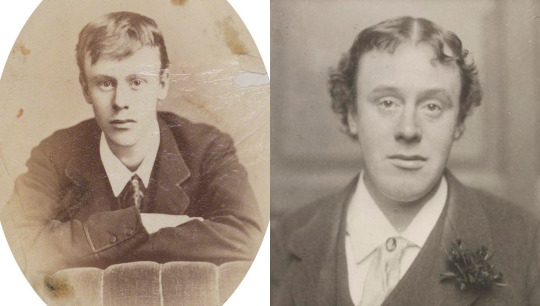
It won’t surprise you to learn that the author, Count Eric Stanislaus Stenbock, was a (very) gay man, deeply involved with the gothic and decadent artistic movements of his day. Born to a Swedish Count and an English heiress, Stenbock seems to be remembered less for his writing than for his character. In The Oxford Book of Modern Verse, 1892-1935, W.B. Yeats describes him as a "scholar, connoisseur, drunkard, poet, pervert, most charming of men" ‒ naming Stenbock as an exemplar of the poetic zeitgeist of the age. Notably however, none of Stenbock’s actual poetry is featured in the volume.
Stories about Stenbock are so bizarre that it’s hard to know how much should be believed. Eric Stenbock supposedly travelled with a multitude of exotic pets and a life-sized doll he referred to as his 'son', dabbled in religions ranging from Roman Catholicism to Buddhism, and decorated his dwelling with peacock feathers, oriental shawls, a bronze statue of Eros and a hanging pentagram. One acquaintance once compared him to a 'magnified child': "very fair hair beautifully curled, and a blond, round, blue-eyed face," who paused at the door and "took a little phial out of his pocket, from which he anointed his fingers, before passing them through his locks." But by his thirties, he was already dying of liver disease after years of alcoholism. He passed away at only 35.
Stenbock’s surviving artistic legacy consists of three volumes of poetry and one of prose, with some of those poems including explicit references to Ganymede or male lovers. So how did he escape the same controversy that dogged similar works by other queer creatives of his day, like Oscar Wilde or Walt Whitman – let alone Karl Ulrichs? Well, simple: his work never attracted enough attention to generate real controversy. Stenbock may have been just as much a character as figures like Wilde, but he hadn't nearly the same talent or success.
One last minor biographic detail that may be worthy of note (discovered courtesy of some very poor-quality scans of his one proper biography) is that the youthful Gabriel of A True Story of a Vampire may owe his name to a real Gabriele ‒ a female cousin ten years Stenbock’s junior, whom he would've spent time with in his teens, and seems to have been especially fond of. Whatever the true significance of that name, he'd use it more than once in his fiction: another short story, The Other Side: A Breton Legend, also stars an angelic little boy called Gabriel, with a similar dangerous attraction to the strange. It features some lovely mood and imagery as it sets the scene, but (perhaps as a result of the lack of a suitable model story like Carmilla) it is, in my opinion, a much weaker story overall.

But again, the most disturbing aspect of Stenbock's biography are the hints about his own relationships with much younger men. His second book of poetry, Myrtle, Rue and Cypress, is dedicated to three people: Simeon Solomon (a gay painter of the pre-Raphaelite movement, whom he met at Oxford), Arvid Stenbock, Eric's cousin, and to "the memory of Charles Fowler" ‒ the son of a Clergyman, who died of consumption at only 16.
This enigmatic dedication is all we know about Stenbock's relationship with Fowler. We don't even know how the they met (Fowler seems to have had a relative at Oxford at the same time as Stenbock, but even this is speculation). But that dedication, in a book which will go on to feature poems about the beauty of Ganymede, or explicitly addressed 'To A Boy' (Tis ever a delight, dear, To gaze upon thy face, To love the life within thee, Fair fashioned, full of grace) makes it hard to read Stenbock's feelings as remotely platonic.
It doesn’t help that the same volume includes a poem about an actual vampire, published ten years before A True Story of a Vampire would ever be penned, but with very comparable subject matter:
With slow soft sensual sips Draw the life from the tender spray, And brush from thy soft lithe lips The bloom of thy boyhood away
It's worth keeping in mind that Stenbock himself would've been only 21 at the time of Fowler's death, and that we don't know whether he ever acted on his attraction (whatever form it may have taken). He may well, as I've seen suggested, have kept his admiration private, idealising the image of the beautiful, dying boy in his final days, in that classic Victorian-gothic way. But it doesn't help that Stenbock's cousin Arvid, from that other dedication in the same book, was 8 years his junior, and that their family apparently disapproved of their relationship as "unnaturally close." Or that another famous Stenbock-associate was Norman O'Neil, a composer whom he met on a London omnibus in 1891, when O'Neil too was only 16. Stenbock was apparently taken by his intelligence and beauty, and would go on to leave him a considerable sum of money in his will. By 1891, Stenbock would've been 31, but his fixations hadn't aged with him.
So how are we to take all this? This was an age where a marriage between a 16-year-old girl and a suitor of Stenbock's age would scarcely have raised eyebrows. Uncomfortable as it may sound today, for many queer youths of the era, a romance with someone older and experienced enough to play mentor may genuinely have represented the safest real option available. There are layers of complicated subtext, meanwhile, in the idea of any gay man of the Victorian era casting himself as a vampiric monster, doomed to ruin the object of their attraction with their very touch. There may be layers more in Stenbock framing his tale as "A true story" before telling us of the misery a foreign Count brought to an innocent family, with his helpless fixation on their youngest child.
It's worth noting also that even in Manor, by Legit Gay Activist Karl Ulrichs, our love story is between a boy of 15 and a man of 19 ‒ an age gap of only 4 years, but large enough at 15 to raise some serious eyebrows. His first story too, Sulitelma, involves attraction between a man and a boy (exact ages unknown). Though Ulrichs explicitly viewed relationships with prepubescent children as reprehensible, he seems to have had no problem with relationships between young teens and much older adults ‒ even printing a story sent in by a reader (details in this article), joyfully recounting how he (the reader) was initiated into the world of male/male love as a 14-year-old by his brother's riding master. Ulrichs saw no reason to disapprove.
To confuse things for anyone looking this up today, google Ulrichs, and you'll find a number of online articles claiming that his own first experience involved being sexually assaulted by a riding instructor when he was only 14. This is wrong on multiple fronts: not only is the story related by Ulrichs as a positive experience, it wasn't even Ulrichs it happened to. No, shit like this would not be okay if it happened today (and frequently wasn't then), but we don't help ourselves by distorting the stories told by our queer forebears to fit modern expectations.
But none of that surrounding context makes the youth of the day any less vulnerable to predation, or Stenbock's fixation on youthful beauty less creepy. Today, no evidence remains to help us guess whether idealising the beauty and innocence of youth was the greatest of Stenbock's actual crimes, or the least of them. Anything is possible.
In brief: welcome to the joy of trying to reconcile the complicated place of pederasty in queer history! I'm afraid you can look forward to seeing a lot of it from here on back.
A True Story of a Vampire is not a bad work of fiction by any means. There are some lovely descriptions and entertaining turns of phrase, and the horror is certainly effective. It may even be considerably more readable than Carmilla to many, simply for being so much shorter. But how you feel about it is really going to be up to you.
One last digression about Carmilla and Christabel
There’s one additional work that I’ve once or twice seen listed as an even earlier queer vampire tale: Samuel Coleridge’s unfinished poem Christabel (1800) – the only problem being there’s no vampire in the story (and how queer it is may be questionable too).
Like Carmilla, Christabel tells of a Baron’s daughter (the titular Christabel) who comes upon a mysterious stranger in apparent distress (Geraldine) and invites her into her home. We never learn what kind of being Geraldine truly is (three further parts were planned in addition to the two that were completed), but when she undresses, Christabel spies something that horrifies her, remembering it later with the words "Again she saw that bosom old / Again she felt that bosom cold." But under Geraldine’s spell, Christabel’s recollection of this incident comes and goes, and Geraldine has soon bewitched her father too.

All ‘evidence’ that Geraldine was intended to be a vampire rests on such details as Geraldine having to be carried past an iron gate into the house, much as vampires have to be invited in – but that particular vampire trope wasn’t actually codified until a solid century later (like most vampire-tropes, we have Stoker's Dracula to blame). The idea that Geraldine has the cold, shrivelled body of the undead and revives herself on Christabel’s blood is a perfectly valid reading, but the more obvious interpretation would be that she’s some manner of shapeshifting fairy creature, weakened by the iron of the gateway, not the entrance to Christabel’s home. The aristocratic literary vampire had existed for over 40 years and appeared in numerous works of fiction by Carmilla's day; but Christabel predates the origins of the genre a solid two decades. For Coleridge to have come up with the idea independently seems vanishingly unlikely.
I mention Christabel here partly for completeness, but mostly to bring us back around to the greater family of Carmilla, which is still legitimately the first known queer vampire story. Though far better known than any other story discussed here today, how it came about is perhaps the most mysterious.
Sheridan le Fanu was a prolific writer, but I don’t know of any other story he’s penned with subtext like Carmilla's (and I’m not quite invested enough to read all of the rest to check, though someone totally should so I don't have to). Le Fanu was married, and had children, and that's all I can discover about his personal life. Was he some shade of queer himself? Did he have connections to anyone who was? Did he even realise what he was writing with Carmilla? Nothing I’ve read about him provides any answers. Nor can I tell you how many readers spotted the subtext it the story was first published. In its own time, it caused no great scandal, nor even seems to have garnered much attention (by contrast, Byron & Polidori's The Vampyre caused an uproar when it was published in 1819, mostly thanks to Byron's established fame and debates over its true authorship). It took until well into the 20th Century for it to obtain the reputation it has today.
But I’m sure it’s no coincidence that it was Carmilla that spoke to Stenbock enough that he chose to retell it. And while A True Story of a Vampire is still the only other vampire story of the era set in Styria, there was almost another one: Dracula, at least Stoker’s early plans for the novel. Styria also remains part of the unused prequel chapter later published as Dracula’s Guest. The setting isn’t the only detail Stoker nearly-borrowed from Carmilla either, my favourite example being the weird schedule by which both she and Dracula seem to have to be in bed in their coffins at dawn each day, both apparently helpless and immobile in sleep, though both are also repeatedly seen up and about later in the day. Neither tale offers any real explanation.
Have I mentioned lately that Stoker, too, was almost certainly some shade of gay?
Now, the fact that two different queer writers both found Carmilla so very inspiring – and would even both publish their own works of vampire literature within five years of one another – isn’t much to go on, in trying to establish what a story like Carmilla might’ve meant to England’s queer population some twenty years after it was written. Maybe Carmilla was being eagerly passed around London’s own Uranian gothic societies at the time. Or maybe two different men happened upon it by chance in wholly different circumstances, and took very different things from reading it. Maybe Stoker didn’t even notice the queer subtext himself. But I can’t help but wonder if just maybe, there's something more than coincidence at work here.
Carmilla the vampire is an explicitly villainous character, her victim confused and unwilling. But she remains one of the most complex and sympathetic vampires of her era. And perhaps, to a community who had never seen Ulrichs’ writing published in their own language, and might never see themselves represented in fiction except as monsters buried in layers of protective subtext, that still meant something to readers like Stenbock, and Stocker, and who knows how many others.
In short, maybe old, gay vampire stories like these really are worth remembering. I'll leave that one up to you.
#queer history#vampires#Dracula#Manor#Karl Heinrich Ulrichs#A True Story of a Vampire#Count Eric Stenbock#Carmilla#gay vampire stuff
63 notes
·
View notes
Text
Watching IFTV and it's really fascinating to see the way Claire's attempts at bullying bounce off Rei's thirst because once you get past the comedy of "Joke's on you, I'm into that shit", there's this persistent and perhaps even radical subersiveness to their whole dynamic, which lies precisely in the sense that it gets to act as a dynamic?
Claire's bullying is often an attempt by her to mobilize the apparatus of noble hegemony upon those she sees as undeserving and inferior, an act of humiliation in which she exposes and "corrects" what she perceives to be an irregularity in the hierarchy and therefore derives purpose by upsetting the position of another, a (dis)placement that draws upon the aspects of the public execution, the symbolic decapitation of a reputation, to re-enact and re-establish aristocratic authority in the theatre of classes and ideas that is the academy.
When Rei responds to this not by defending herself in terms of the dubious categories of essence or ability that have propped up this profoundly unequal society, but by doubling down on the theatricality of the ritual humiliation, by embracing its exhibitionistic aspects and transforming it into a heightened platform for the declaration of her queer identity, she accordingly elevates her queerness by its encounter with a hegemonic power that it refuses to be categorised or stereotyped by, and indeed subsumes the thrust of Claire's inquisitions and degradations into her gleefully transgressive play of performances (doubly relevant given that she knows she's in a game), attaining freedom through stock characters, writing herself and Claire into a complexity not afforded to them by the original text by flipping the script.
While Claire attempts to bring the abstract and lofty ideology of the aristocracy, the hyper-public common sense of inequality that is enshrined in law and culture, into the arena of public interaction, hoping to make an example out of Rei, to make an upsetting reality conform to the script she's been schooled in, Rei moves in the opposite direction, and brings the private into the public, politicising the otherwise concealed, downplayed or ritualised matter of sexuality and attraction into daily life where it cannot be ignored. While Claire strives to strip away what she sees as false pretensions to expose the true essence of people underneath, believing that it shall confirm the differences she's been raised to believe are inherent in the classes, Rei turns these attempts at revelation into a symbolic eternal striptease, revealing always another layer, another exposure that turns back on the one who hungers to strip away, turning their desire into a dependency, a "not yet" that lets Rei set the world to her own timepiece.
As such, Rei integrates at one stroke the fact that she loves women and the fact that Claire loves aristocracy, yoking the two into a similar level of political importance, the genius of which is that it works two ways. On the one hand, it renders Claire's bullying and class violence an act of seeming kinkiness and indulgence rather than the sacred duty of the chosen few, an "Oh my, not here, darling, you're so demanding today!" in which Claire is framed as a dommy queen going to great lengths to maintain the roleplay, an actor who clearly likes her bit in this French-nobility-themed drama a bit too much, hamstringing entirely any authority she might demand outside the context of the bedroom. On the other, by putting forth the perspective that all the ritualism and pomp of aristocracy is just that- rich kids playing dress-up and not at all the solemn proceedings of the gifted elite, Rei also strikes a symbolic blow against the cult of nobility, puncturing the gravitas with which they appoint themselves protagonists in politics, and exposing in her invocation of roles the possibility also that these roles might change, that any day now the next set of domineering and imperious rulers might not be of noble birth at all, and the day after the troupe may put on a different production entirely, forgetting in their fun all this now-outdated talk about empires and princes.
While Claire is of course initially incensed and disturbed by this, given that Rei challenges and erodes the entire purpose of her identity-affirming tactics of bullying and challenging usurpers, making her wonder if she is truly entitled to any grander obedience and special status at all, these ideas of fluidity and performativity might also represent for her a chance at change and escape, a route out of the crumbling palaces of a decaying royalty. If she is not in fact essentially and transcendentally the daughter of a noble house, then she also needs not act like one, and could be anyone she pleases and be with anyone she's pleased by. Rei's queerness therefore represents a challenge and threat to the entire system she is housed and mantled in, but also offers her a path to happiness as a person, a right to joy and love that is freely given to all who live and needs no grounding in nobility- indeed, it is only by the destruction of her mythos and iconography, that terrifying and liberating act of blasphemy, that she can become human and therefore go on to become a freak, the making-by-breaking that is promised by the queer revolution, a transcendent transsexuality, a metamorphosis that makes all reality into the cocoon that it shall soar free of, feeding-as-needing, desire as production and a new genesis.
In short, I Favour the Villainess boldly asserts that loudly loving evil women is a vital step in the revolution, and that's such an important message. "I Can Fix Her" as "I Can Create a World Where She's Just a Travesty and not a Tragedy". Wanting so badly to give a bitch head that you rescue hers from the guillotine. "My favorite Girlfailure was Marie Antoinette". Simply an excellent premise.
198 notes
·
View notes
Text




out of context laws of attraction (2/?)
133 notes
·
View notes